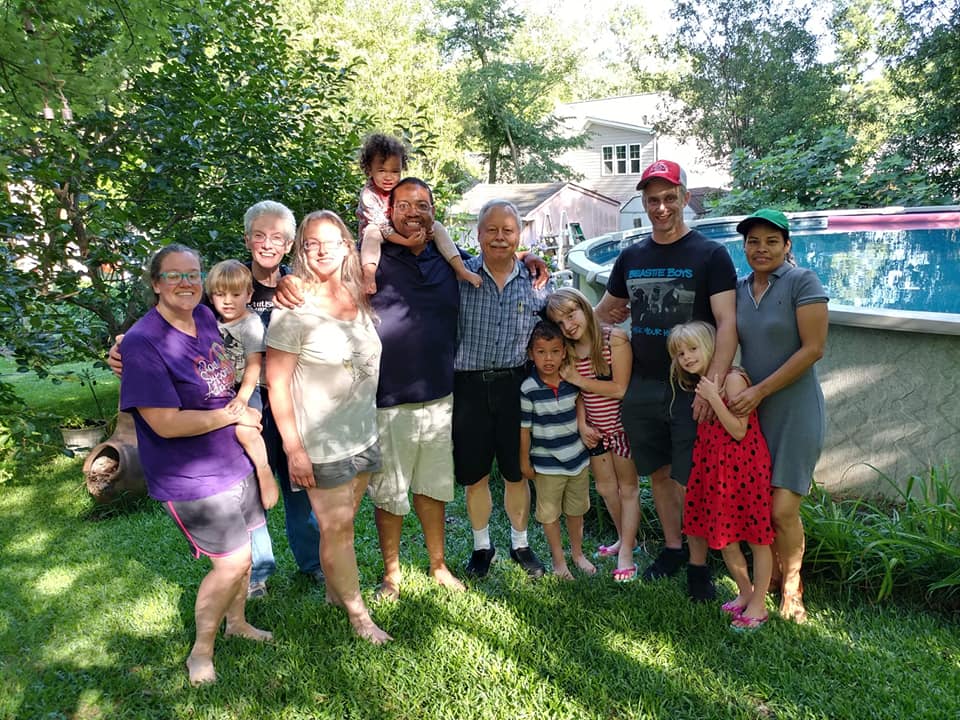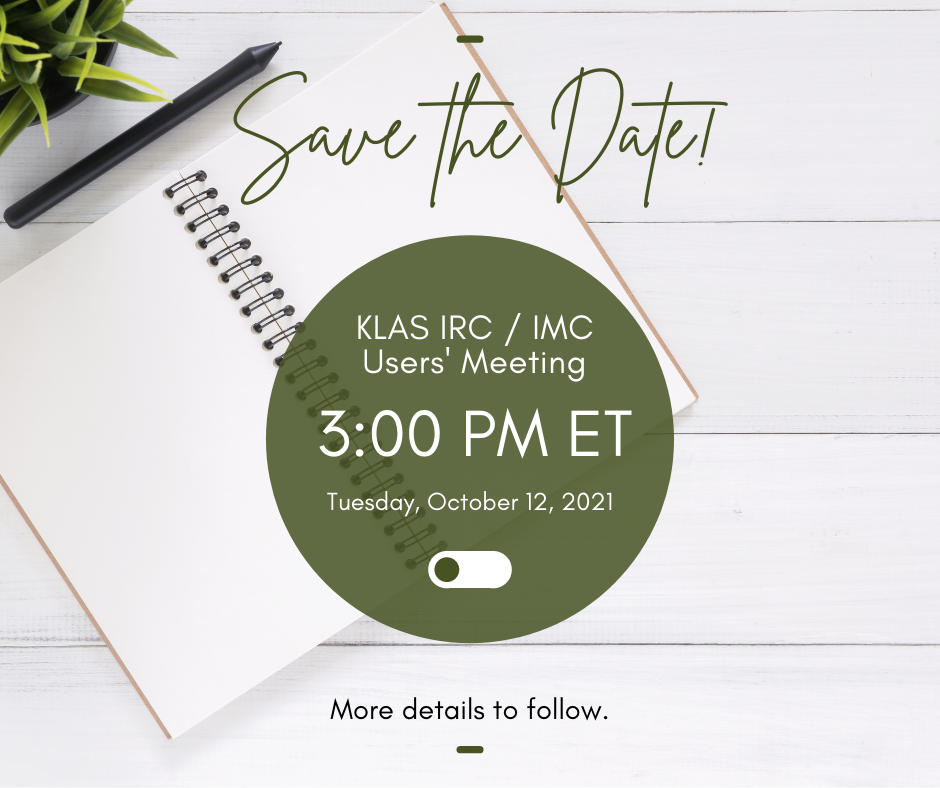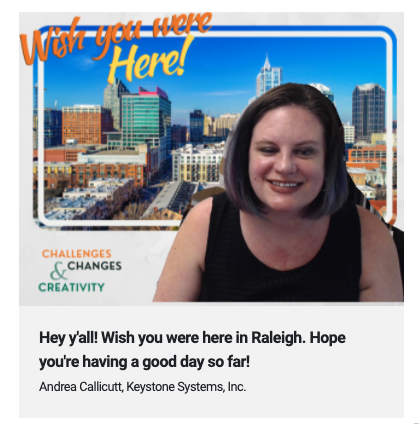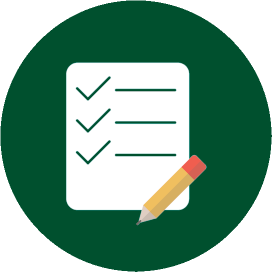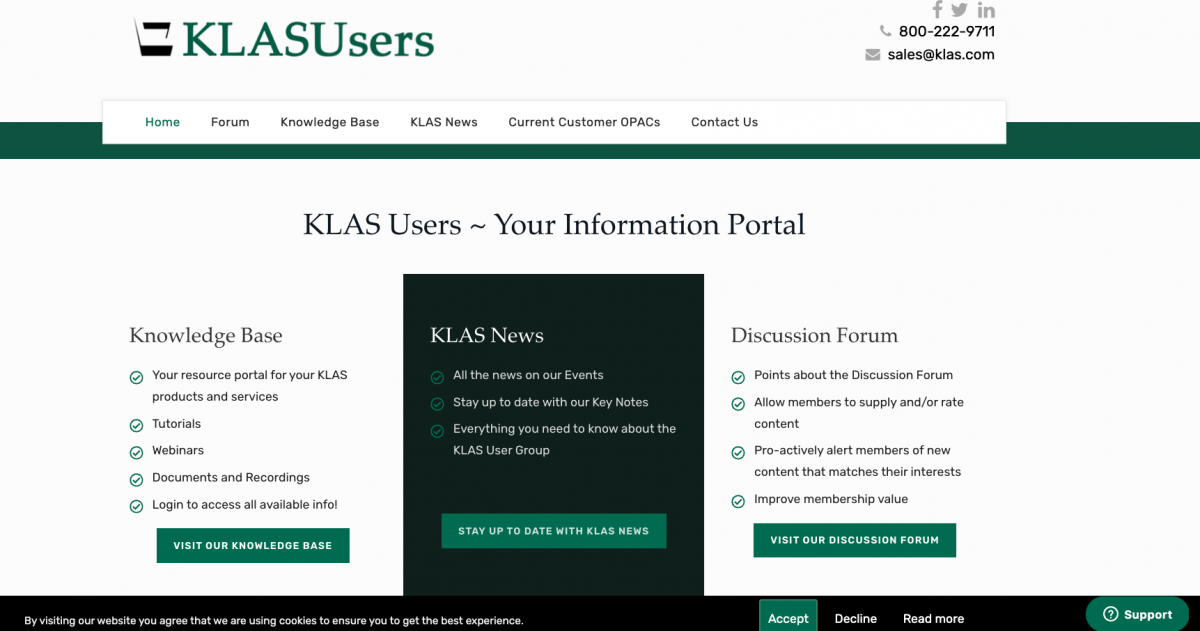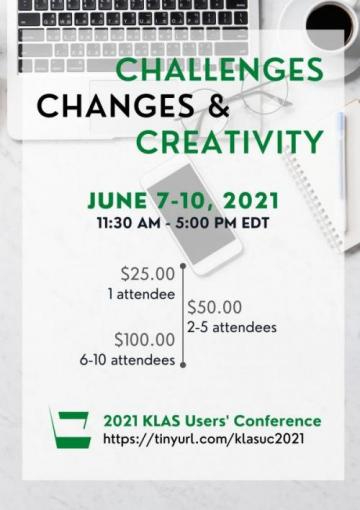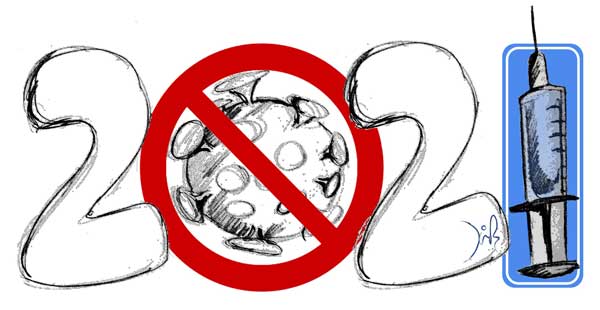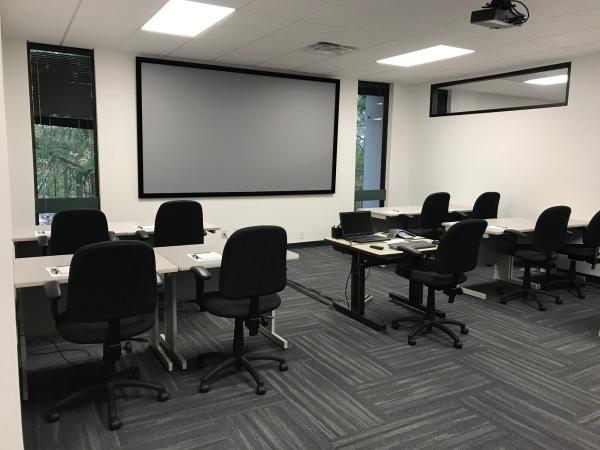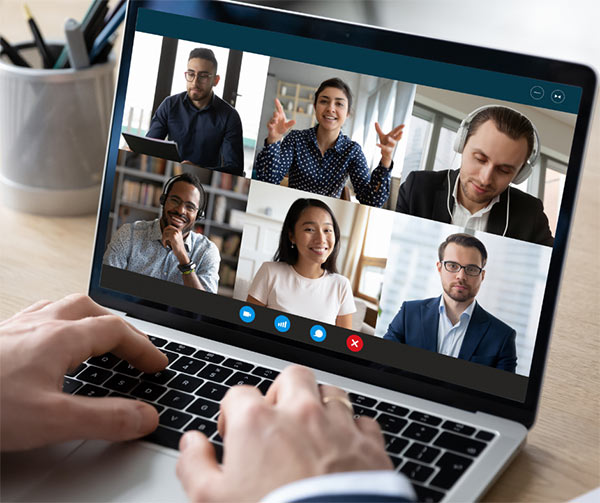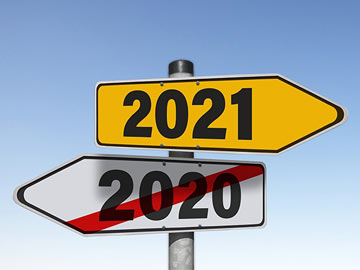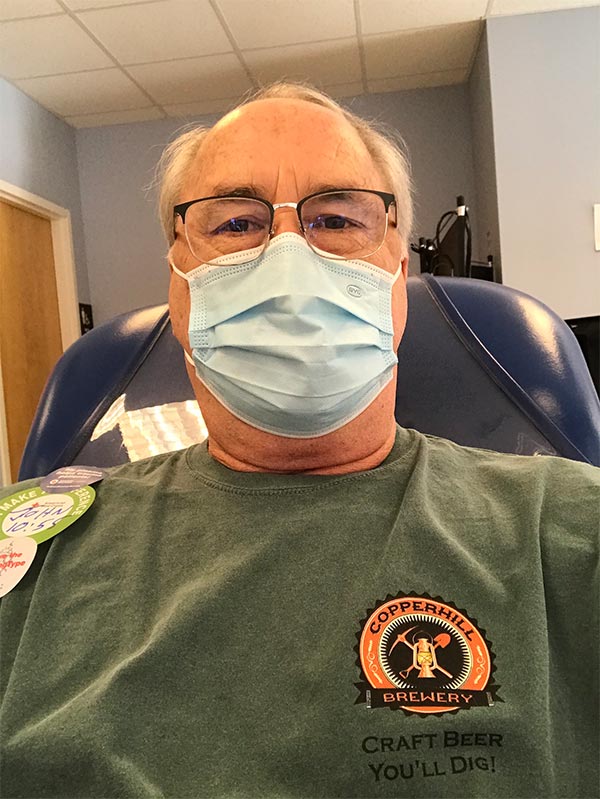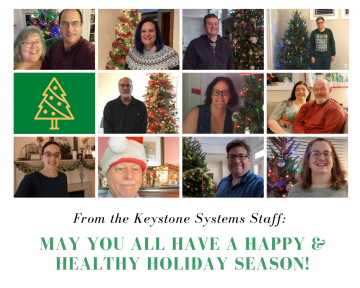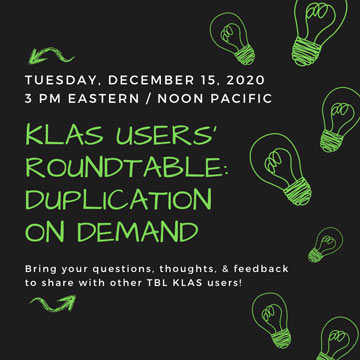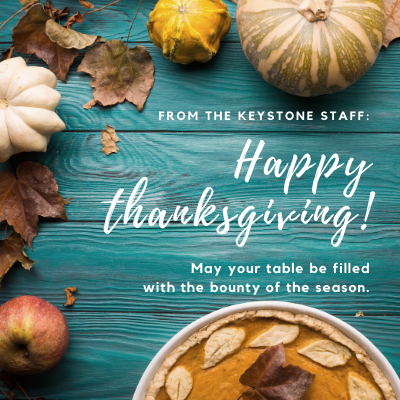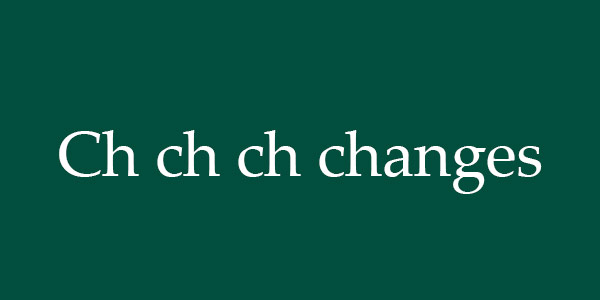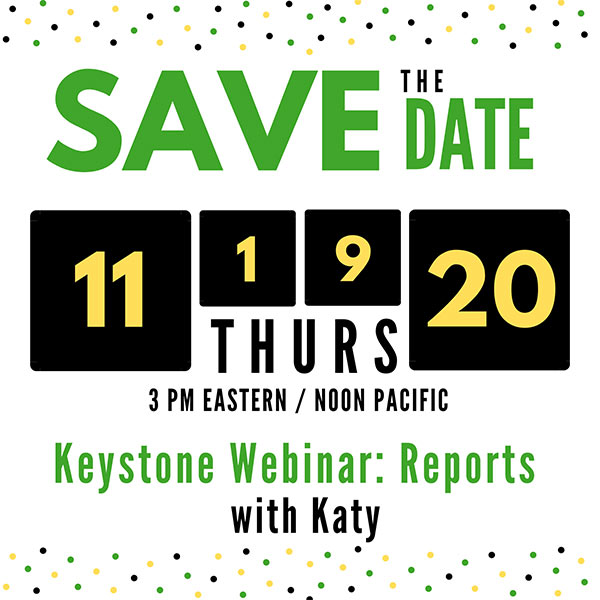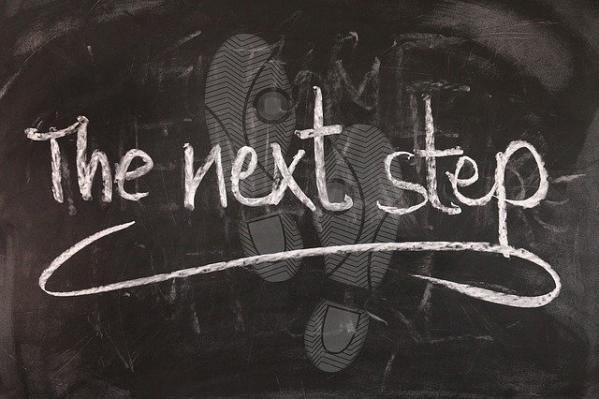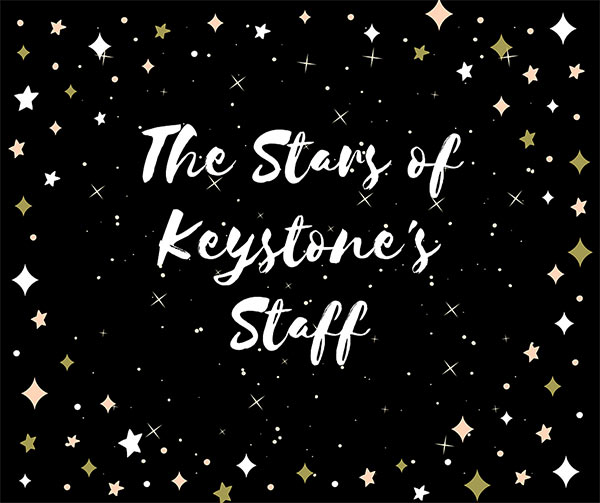Latest IRC / IMC News
ExpiredToday, I want to share a few items of particular interest to our Instructional Resource / Instructional Materials Center users including the upcoming users' meeting at APH, an update about our APH integration project, and a new IRC addition to our Users' Community. Read on for more info about each.
KLAS IRC / IMC Users at APH 2021 Annual Meeting
As you have probably heard, the 2021 American Printing House for the Blind Annual Meeting will be online again this year.
- KLAS IRC Users' Group Meeting at APH 2021: Tuesday, October 12 at 3:00-4:30 PM Eastern / Noon-1:30 PM Pacific
We are hosting the 2021 KLAS IRC / IMC Users' Meeting on our Zoom account.
Meeting Agenda:
- Keystone Update & Current Customers
- Community, Training & Events
- New KLAS IRC Features
- Upcoming Development
- Questions & Discussion
Meeting Invite:
Join Zoom Meeting: https://us02web.zoom.us/j/88072964152?pwd=NUltTVdISVRBS0VuS0Fud2VsUTZmQT09
Meeting ID: 880 7296 4152
Passcode: 167077
Dial-in for audio:
+1 929 205 6099 US (New York)
+1 301 715 8592 US (Washington DC)
+1 312 626 6799 US (Chicago)
+1 669 900 6833 US (San Jose)
+1 253 215 8782 US (Tacoma)
+1 346 248 7799 US (Houston)
Find your local number: https://us02web.zoom.us/u/kkZmZM6Wu
September 2021 APH Integration Status Update
During our August 24 KLAS New Features Webinar Katy shared the latest info on our ongoing project to integrate KLAS with APH's catalog and ordering system. We know many of you are excited and anticipating the completion of this integration project (as are we) because it means much less data entry and duplication of effort for your staff.
I asked Kyle Honeycutt, Manager of Software Development, for any additional updates he may want to share with our IRC / IMC users. This is what he said:
Using a tool called "PostMan," I have been able to successfully retrieve catalog information, post orders to their test system, and retrieve status of orders. I am in contact with APH and their contractors regarding what information is mapped in which fields, and what criteria to query on to retrieve exact catalog availability. Once all these questions are answered, the next step will be adding calls to these services within the KLAS programs.
Basically, we are using a known testing tool to confirm that the services work as expected, and that we know exactly how to consume them. Then we will introduce the complexity of consuming the processes from within KLAS.
What that means is: we're making good progress and using known tools and processes to accomplish the integration. At this point, our development needs to verify the item information being pulled from APH's catalog is identified correctly and then setup the service to pull it into KLAS in a logical manner.
New IRC Installation
Finally, I want to welcome a new instructional resource center to our KLAS Users' Community!
The West Virginia Instructional Resource Center began their implementation of KLAS this week with an onsite visit from Marion and Mitake. We're excited to work Debbie and her staff in the next few months as we learn their workflow, policies, and process and how to best make KLAS work for their organization and clients.
We're excited to have them on board, and hope you'll join us in extending a warm welcome.
During our latest New Features Webinar, we had a question about getting the complete list of all languages recognized by PIMMS. Here are some things to know about that list:
- The list that PIMMS adopted is based on the ISO 639-2 Bibliographic list, a standard list maintained by the Library of Congress. There are 487 languages on this list.
- This list is designed to represent all the languages that you might expect to find a book written in, but it is not necessarily a list of all spoken languages.
- The code values in the ISO-639-2 list are used in MARC records to indicate the language(s) of a title.
- The code values that PIMMS accepts are numeric codes, instead of the alpha values that represent the standard they are attempting to match.
There are also some things to consider regarding language codes in KLAS:
- The list of Patron Language codes (PatLang) are mapped to the numeric PIMMS codes.
- The list of Language Codes for title records (LangCode) are mapped to coincide with incoming MARC data.
- The local codes for Patron Languages and Language Codes for title records need to match for Nightly and Book Search exclusion checks.
- The list of values in a drop down are sorted by Code Value instead of description.
- The more values you have in a list of codes, the more difficult it gets for your staff to use.
- Changes to a Code list are not applied retroactively; clean up needs to be made on all affected records.
In short: there are a ton of language possibilities out there. However, when you balance out the needs of your patrons, your collection, and your staff, the only languages you really want to have in KLAS are the ones you need right now.
You can certainly add more languages than you have now without causing headaches—and we’re happy to help you do it! Languages that your patrons speak, that appear in the collection, and/or that you want to track interest in should definitely be added to your code lists.
Just know that too many languages can make things complicated, and too many changes later on can be a pain.
If you want the long version, read on for more details.
Difficulties of a Long List
Having “too many” options in a drop-down field introduces some really interesting ways to mess up data entry. For example, while the full list of PIMMS languages was briefly available, one patron was given “Middle English” as their default Language! The more options there are, the easier it is to accidentally select the wrong one, either by misreading or mis-clicking.
In addition to the unwieldiness of such long list and the ease of selecting an unintended entry, these lists sort by code not full description. This means you should take care with how you setup the codes, or the list will not be in a straightforward, alphabetical order. Once you get more than 30 or so entries in a combo-box, having a logical sort order becomes very important! For example, browse through the list of states on the Contact tab. The state codes are well-known—but they don’t sort the same as the names of the states. If you weren’t already familiar with them, could you easily use this field? What if the states weren’t in order at all?
Getting back to the list of languages that you are managing in your database – another thing to keep in mind is the way a language might be referred to by a patron vs its official name or designation. Many libraries have had Cambodian in their Patron language list for years as C or CAM but the Marc value is khm for Khmer. Serbo-Croatian was previously used for what are now distinguished as four different languages whose official codes are based on the spelling of the language in that language – hence HRV for Croatian. The MARC code is PER for Persian but the language is frequently referred to as Farsi.
Will those codes help your staff browse to the right part of the list? It’s important to understand how patrons might ask for materials in these languages, and choose local codes and descriptions such that your staff can match what a patron is saying to the proper selection.
Fortunately, the Code Files allow you to use a local code for the Patron and Catalog modules while still mapping to PIMMS and to the codes used on MARC records. Think about the local codes you may want to use, and how can use them to enforce a reasonable sort order.
Remember: selecting logical, well-sorted codes, and then selecting the right one from the list every time will be easier the shorter you keep the list.
Changes to Code Files are not retroactive
Code Files can be tricky to deal with, especially in cases where you are dealing with large numbers of records, mapping between modules, and mapping with both PIMMS and MARC records. If you’re up to it, you can add to your PatLang codes, but we recommend you leave the LangCode file to us—and don’t go hog wild changing the codes.
Here’s why:
Code Files aren’t like Headings. Headings are linked on each record; when you update a Heading, the changes appear on each record. Codes get stored on each record instead, and the Code File simply defines what that code means. If you change a Description, that’s fine! But if you change a Code, all the records with the old code still have the old code. Records with the old code won’t be able to find it in the Code File to define it, triggering error messages and generally breaking things.
Plus, for this Code File, mapping must be maintained between the Patron and Catalog modules. Doing so means Nightly can match the patrons’ preferred Language to the Language on title records.
So, if you want to change one of your language codes:
- Add the new Code to the PatLang Code File, setting the CMLS Lang Code to match the code you want to update.
- Find all of the patrons with the original Code on their record, updating each of them to use the new Code instead.
- Only delete the original Code from the PatLang Code File once it’s no longer associated with any
- Repeat the process in the LangCode file, with the catalog records, making sure to maintain the CodeXref (MARC record mapping).
Or... better yet, have us do it.
Any time you need a language added to the list, or if you want to adjust the local codes in use for sorting the list, please send the details to Customer Support at , and we’ll take it from there.
Policy Changes are also not retroactive – About Bilingual Titles
While you’re thinking about all this, here’s one last thing to keep in mind:
In the past NLS issued MARC records for bilanguage titles with a combined code, such as E/S or S/E for books with both Spanish and English parts. That policy changed! According to NLS, these books are now given a language code reflecting the “primary” language of the title, even if one or more additional languages are included. For example, “Drivetime German” which is marked as E/G in a number of databases, is primarily in English (with some German) according to NLS. Meanwhile, “eTicket Ingles” is a Spanish title (which also has English).
New MARC records arrive cataloged this way. It’s up to you whether you want to update their records to reflect the bilingual nature of the titles, or want to update your back catalog to use the approach of cataloging the primary language.
For more information about this, or advice on how to apply changes in the direction of your choice please let us know!
Since 2018, we've made an annual post detailing our infrastructure and planning efforts to serve your library, your staff, and your patrons after a natural disaster, and share the additional improvements we've made in the last year to our Disaster Preparedness and Recovery plans. We've spent a significant amount of time building infrastructure, reviewing procedures, and planning for an untimely incident. For this year's post, we starting with our most recent upgrades and working backwards to our original September 2018 update.
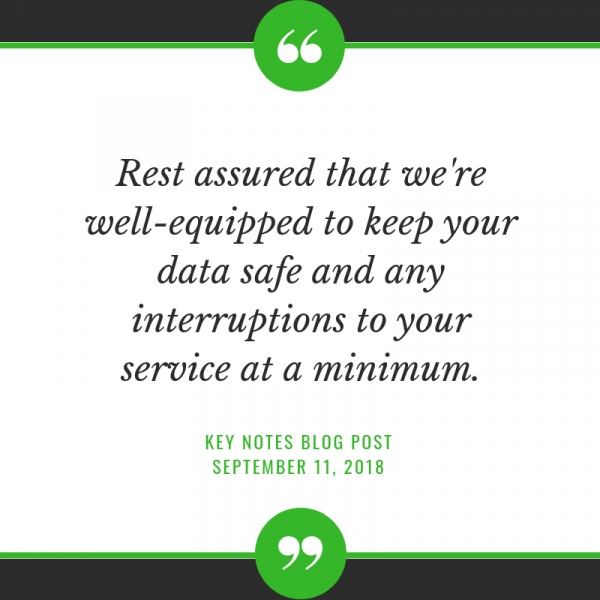
2021 Updates & Improvements
To prepare for this year's post, we asked Lee what he felt were important updates or changes made in 2021, or for any other info he wants the KLAS Users' Community to know about our efforts. The two items he mentioned are:
- The recovery process is the the same as before, but note that restoration of databases is sequential (per server), not parallel. So, while a one-hour recovery for a database at top of the queue is possible others at the bottom of the list will have a longer wait as the recovery process works through the list.
- We have added weekly server snapshots to our AWS backup servers. For an end user, this makes no difference to restoration, but it makes Keystone staff's jobs infinitely easier.
2020 Updates & Improvements
Much of what we put into place as part of our disaster preparedness plan in 2020 is what allowed our staff to begin to work from home in March of that year and continue to do so even today and for the foreseeable future.
On September 1, 2020 posted a list disaster recovery and preparedness process and infrastructure improvements we'd make over the past year such as:
- Cloud-based databases running in multiple regions, to better place the system geographically near the library
- Incremental transaction data backups happen every 10 minutes
- Database backups are saved in the local region, as well as to a separate region. If a database hosted on the east coast has a disaster, there is a copy of the database backup in another region.
- Database backups are saved to the local server, as well as copied to S3 storage
- Database backups are also copied from Amazon's data centers to Google Storage
- A new automated system restoration process which had been manual prior to the beginning of 2020. As an automated process, it takes about an hour while the previous manual process took 10-12 hours at a minimum.
2019 Updates & Improvements
On August 15, 2019, we shared the news of some additional steps we'd taken to further enhance our disaster preparedness and recovery efforts including:
- Back-end changes to KLAS 7.7 to it quicker and easier to create and store database back-ups
- A move to storing back-ups in the cloud, so they are safe and retrievable no matter where disaster strikes
- A new monitoring app so staff can be notified right away if something goes wrong with the servers and any emergencies can be dealt with as quickly as possible
2018 Updates & Improvements
Our September 11, 2018 our first Emergency Recovery & Disaster Preparedness Key Notes Blog post was written as we faced the threat of Hurricane Florence and shared details about we'd implemented at that point including a combination of both procedural and physical preparedness such as:
- A gas-powered generator at our office
- Redundant internet providers, firewalls, and network routers
- Daily backups of data to our on-site servers
- Weekly data backups stored offsite
- Encrypted database backups on AWS S3
- VOIP Telephone system to allow staff to work remotely
- Keystone Status Page to communicate database availability, even if we’re unreachable
- Contingency plans and equipment needed for remote database and customer support
As you may have heard, PIMMS recently added a large number of new Patron Language codes. This will be great for getting data and statistics on non-English-speaking patrons... but it also provides an opportunity for much better patron service!
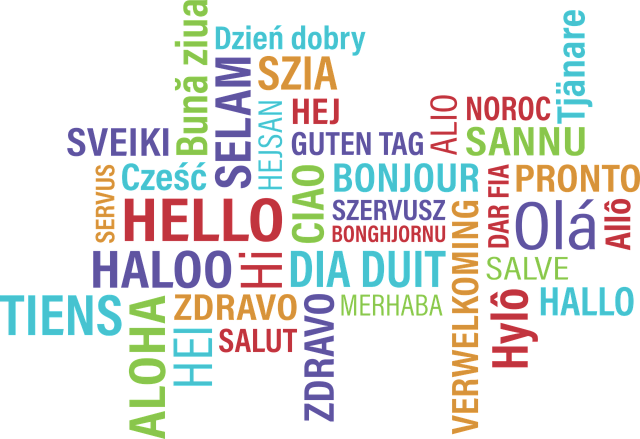
Like many opportunities, though, there's a bit of challenge too. In KLAS, Patron Language (aka PatLang) is not like Subject or Author preferences. There is no Nightly Program that goes through, finds books in a patron’s preferred language or languages, and assigns them or adds them to a Service Queue. Instead, Language is one of the options for every other program to check against.
Most Libraries have Nightly set up so that Requests and Reserves ignore language, but Subject and Author have to match. This allows any patron to request a book in a language they don’t usually receive, but ensures that automatic selections will be in their preferred language (or languages).
This also means for patrons who speak a language other than English or Spanish, there will be few-to-no books available by AutoSelect. NLS is working to fill out the foreign language collection, but for now, Nightly will find few (if any) Mystery books for a patron speaking only Cantonese, and few (if any) Romances for a patron who only speaks Polish.
So how do you ensure that your Cantonese- and Polish- (and Everything Else)-speaking patrons get books?
First, they need to have the specific language(s) they speak on their profile. If they have a Patron Language of just “Other,” NLS won’t know what languages are most needed, and you won’t be able to match up that patron with any books in your catalog. That patron will only ever get Requests and Reserves (potentially including Series, depending on your Nightly configuration).
Second, you need to make sure they have a preference setup to find books matching their language. At this time, our recommendation is to have Subject headings for each of your Patron Languages other than English and Spanish.
This allow you to add the subject “Cantonese Books” to all titles in Cantonese and give your patron a preference for any/all of those books. This is much more efficient than needing to either give your patron preferences for every subject you might get a Cantonese title in or manually doing a book search and adding requests for the patron every time a new batch of Marrakesh titles are added.
Additionally, a patron with both English and Polish as Language preferences and both Romance and Polish Language Books as subject headings will receive a mix of Romance books in English and whatever's available in Polish.
Hopefully the foreign language collection will eventually be large enough you can send foreign language titles by actual subject preferences. But, for now, this approach will ensure patrons get what you have. Plus, NLS will get the statistics on what languages are most needed, steering their collection development to the benefit of your patrons—a very win-win scenario.
Please let us know if you have questions, any time you need more Patron Language options added to your list, or if you need help setting up Subject headings for specific languages.
We planned to offer our next KLAS New Features webinar on Thursday, August 19, but after learning NLS will be offering "Training for finding Marrakesh Treaty materials on BARD" that afternoon we chose to postpone rather than conflict. Then, we moved it to Thursday, August 26 only to learn of another NLS training as well as APH's EOT meeting to be held that afternoon. After consulting with the KLAS Users' Group Officers and Program Committee, we chose to reschedule a second time based on their feedback.
Therefore, the next KLAS New Features webinar will now be held at 3 PM EDT / Noon PDT on TUESDAY, August 24.
We were so excited with the attendance at the 2021 KLAS Users' Conference last month and wanted to make sure as many of y'all as possible join us for our upcoming live webinar, so here ya go! Below is all the relevant info. We hope you'll be able to join us!
SAVE THE DATE for our next KLAS New Features webinar!
Who: Any and Every KLAS User! We'll be covering the latest new features and functionality for our IRC, LBPD, and others.
What: KLAS New Features Webinar
When: 3 PM Eastern / Noon Pacific Tuesday, August 24
Where: Keystone's Google Meet
Meeting link: https://meet.google.com/yhp-whfr-tyf
Dial-in for audio: +1 662-547-1247 PIN: 316 831 303#
More phone numbers: https://tel.meet/yhp-whfr-tyf?pin=2972669584815
If you have any questions you'd like us to answer, or other input please feel free to comment on this article, post on the discussion forums, or send us an email. To receive a calendar invite, please send an email to Drea () with your request. This webinar will be recorded and posted to klasusers.com for later review.
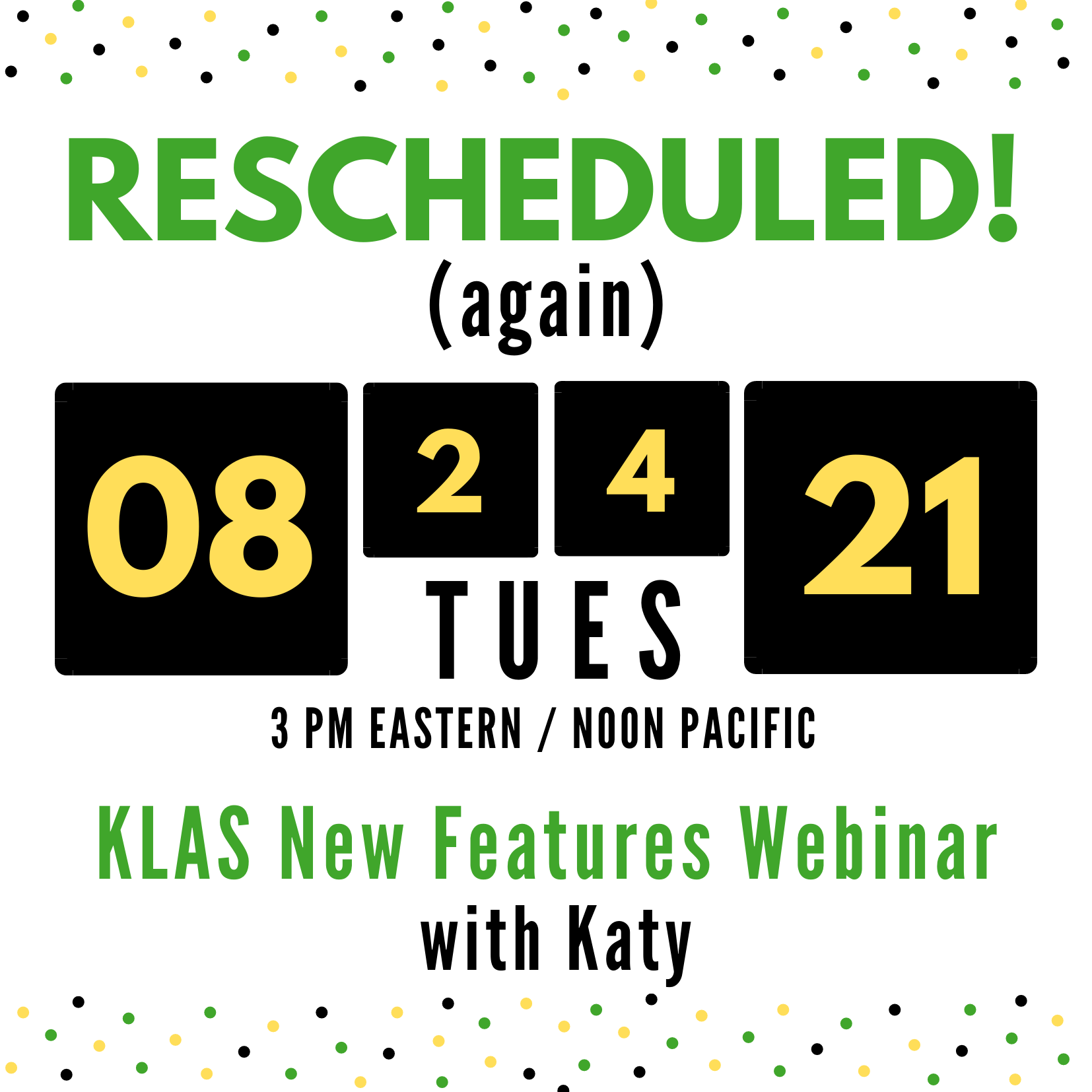
Let’s talk training!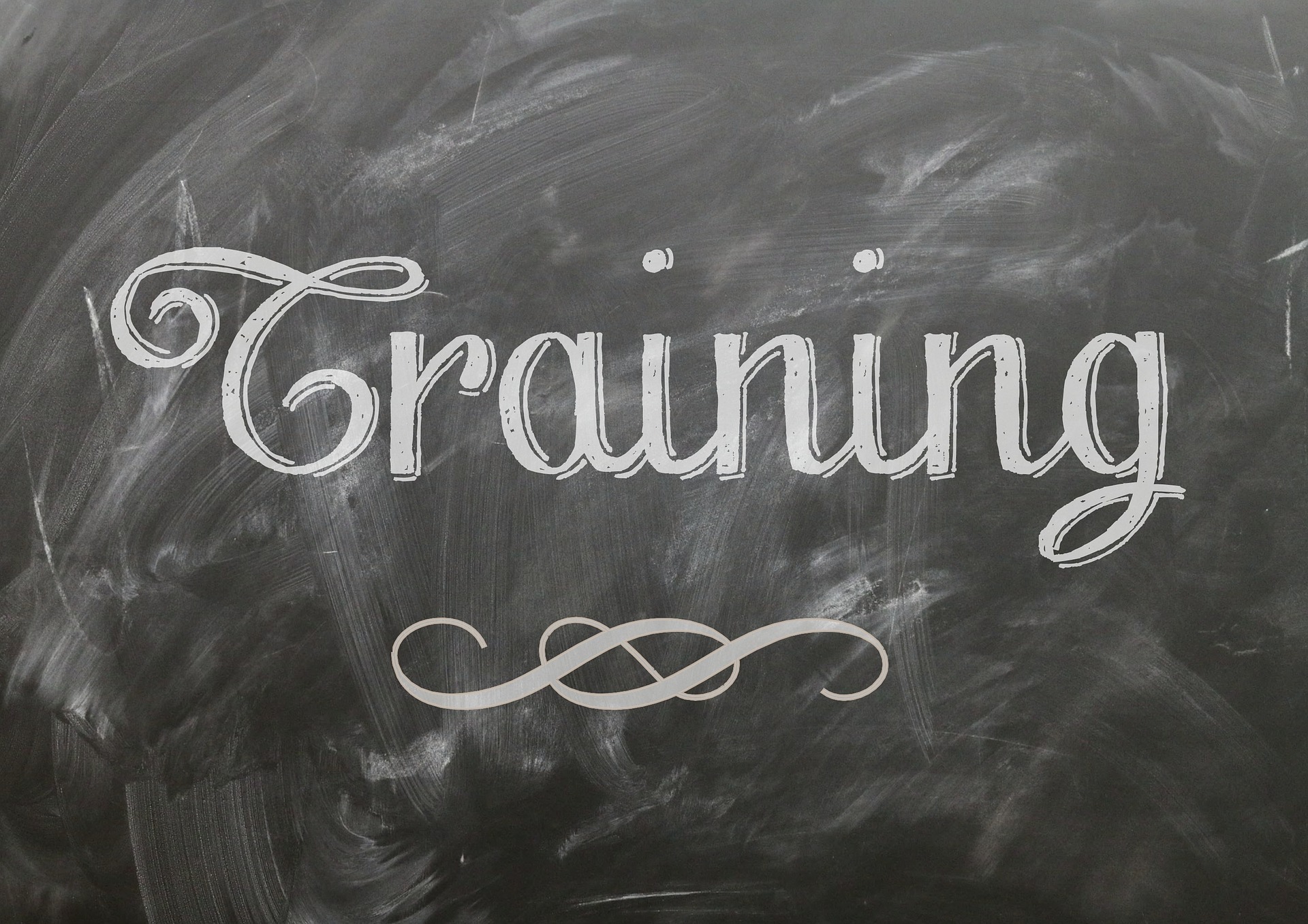
We try to have lots of resources available for everyone, and of course our Customer Support team is always happy to answer questions, but we think the availability of online webinars and other training opportunities are also incredibly valuable. That’s especially true between conferences, as we are now on a biennial schedule.
With that in mind, let’s take a look at what’s coming up, and what other opportunities are available for you.
Upcoming Webinar
Our next Keystone-presented Webinar is scheduled for Thursday, August 19th at 3pm Eastern Time. I’ll be covering New Features released since the conference, so if you haven’t been keeping up with those Release Lists (or if you have questions about any of the new features) please make sure to join us!
As usual, if you can’t make it, the session will be recorded and posted here on KLASusers to view at your convenience as well. I’m always happy to take questions or requests ahead of time if there’s something specific you want me to address.
Possible Future Webinars
We plan to continue regular New Features webinars, but what else would you like to see in terms of Keystone-presented webinars?
We’re likely to do the occasional open Q&A Session and perhaps a dedicated Duplication Q&A. We’re also discussing a webinar series specifically for new users. Would these be valuable for you? What other topics would you benefit from the most?
Please let us know in the comments section or send us an email describing what you hope to see from us!
Custom Webinars
Of course, while webinars open to the full Users’ Group have their advantages, sometimes you need something more specific for your staff or organization. Customer-specific webinars can get deeper into just your questions and provide answers and training tailored to your settings and workflow.
To support the transition to Duplication, we're offering Duplication Training webinars to each library as they get their duplication equipment. But, we also know one-hour likely isn't enough to learn everything you need to know. If you need a refresher or follow-up session, please let us know and we'll get something scheduled.
Need something else? There's the option of arranging custom webinars or a webinar series on whatever topic you need--whether it's new staff training, review, or something in-between. This is a paid service, so let us know if you're interested and we'll send our current online training rates.
Other Training Options
Want to be sure you have regular training built in the budget? You can include a set number of Training Hours in your contract to be scheduled as needed during the year. This is a great option for libraries with a lot of turnover or special projects, or who have a harder time getting one-off expenses approved.
Finally, with vaccinations widely available we can start offering In-person Training again. Like custom webinars, in-person training is flexible for your needs with the added benefit of introducing us to your space and helping us learn your workflows and systems a whole lot better. This is our preferred option for Assistive Technology Training since it allows us to set up the AT user's workstation and software in addition to talking them through using it.
I hope this breakdown has helped you understand how Keystone can help you and your organizations keep up to speed! Please let us know what Webinar topics you'd like to see from us--and get in touch if you need a quote for something tailored to fit.
You've likely already seen a link to the 2021 KLAS Users' Conference Attendee Feedback Form created by the KLAS Users' Group Officers and Program and Logistics Committees. With this being such a different year, it's more important than ever for us to hear from you!
In addition to getting feedback from attendees, though, both Keystone staff and the committees have each gotten together to discuss their own observations about the conference. By digging into the conference's schedule and content, as well as the PheedLoop platform, we can make sure we learn from what went wrong and take note of where we got it right.
Today I want to share some of our notes from these conversations so you know what's been our minds. (Agree? Disagree? Have thoughts on something else entirely? Please let us know--starting with the Feedback Form!)
Schedule
No schedule will be perfect for everyone, but our discussions looking back on this trended positive. We managed to offer a lot of sessions, and time them reasonably for everyone, regardless of time zone. Other ideas were discussed, but on the whole, this schedule seemed to work well for an online conference, with one exception: the month of June can be a difficult time for IRC / IMC KLAS Users to attend.
We also had split opinions on the strict enforcement of session times. On the one hand, it kept everyone on track and moving. On the other hand, it also resulted in some pretty abrupt cut-offs... as did ending sessions manually without accounting for the 10-second broadcast delay--sorry about that!
Content
We were thrilled with the amount and variety of user-proposed and user-led sessions! The Keystone staff especially appreciate the effort made by the committees to recruit and involve more users throughout the conference.
One complication we identified was that some sessions applied to more "tracks" or topics than we'd initially thought, and ended up scheduled against too-similar content. It's probably impossible to avoid schedule conflicts entirely, but one idea from our discussion was to provide a better way for the presenters themselves to identify the topics their session will cover and / or intersect with.
Platform
While we were satisfied with the PheedLoop virtual event hosting, there was definitely plenty to discuss on this front. It was a little surprising which features generated a lot of interest, and which fell flat. We made sure to consider whether that was the platform itself, people taking time to learn it, or just a matter of leaving time for it. For example, the Networking rooms were barely touched. If we want to try them again, we need to make sure there's a designated session block instead of expecting people to give up their valuable breaks to try it (especially since many people need to use those breaks to keep up on their day-to-day work).
We really liked a lot of their back-end and event management tools, but we have a long list of suggestions, feedback, and feature requests to pass on to the PheedLoop team. One strong positive: since signing on with PheedLoop, we've seen a lot of activity in terms of useful updates, so we're very hopeful that it will get better and better over time.
Final Thoughts
Virtual conferences have their pros and cons. Going online meant a lot of expanded access to new user presenters (plus other attendees) who may not have been able to attend otherwise. On the other hand, we saw mostly very familiar names, in the chat boxes and especially unmuting and speaking up in the Zoom sessions. It's impossible to replicate a lot of in-person conference experiences, but we wondered if we were doing enough to help new attendees get to know the Users' Group and feel comfortable participating.
Remember: this is your conference--so don't be afraid to let us and / or the committees know what we're doing right, what can get better, and what we haven't even thought of. We hope to hear from you!
WebOPAC Preview
ExpiredWe are working on making improvements to the WebOPAC to ultimately make it a more user friendly experience for Patrons. A part of this will be revising the "My Account" menu, so it will be easier to use.
The new version of the menu will more clearly present the options for a particular topic or area by giving the patron dedicated menu options for viewing currently checked out books, books they will receive next, and a searchable reading history.
In addition, we want to offer Patrons more control over certain areas of their account. This will include things like adding subject likes and dislikes, and adding, removing, or Rushing Requests and Reserves. Duplication Patrons will also have an opportunity to interact with their account and be able to re-order their Service Queue to decide what books they want to receive next.
I’m going to go through each section of the My Account menu and talk a little about some of the changes we are working on. Please understand that the changes discussed in this post are still in development and subject to change.
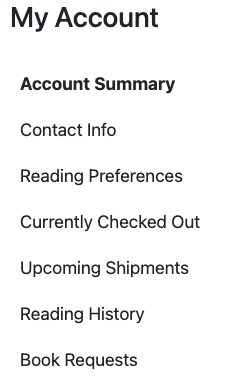
Account Summary:
Starting with the Account Summary page, there isn’t much going on here yet. Ultimately we are looking at letting the patron change their password on this page.
Contact Information:
The Contact Information section will list the Patron’s current mailing address. There will be a way for the Patron to submit an address change to be sent to library staff for review. The formatting of an address in an online form can get out of hand and trying to translate that back to KLAS can be problematic, so this is a safe approach to take.
Reading Preferences:
The breakdown of the Reading Preference page will change. It will be broken out by each category (Subjects, Authors, Series, Narrators, Languages) with a “Likes” section and a “Dislikes” section in each category. Patrons will have the ability to select “Remove” and remove a preference. We are working on implementing a simple interface for a patron to be able to add a preference. This is challenging given the similarity in some preference codes, but we may be able to work out something that is user friendly and will make the appropriate addition in KLAS.
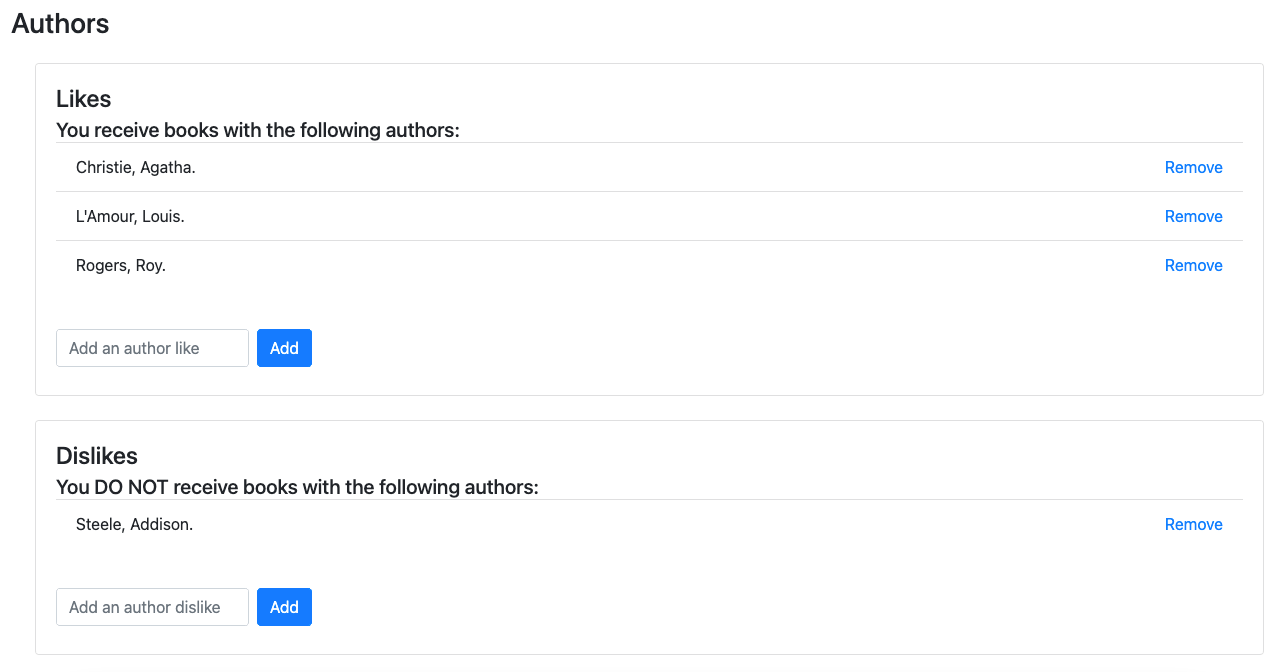
Currently Checked Out:
The Currently Checked Out page will show Patrons the books currently checked out to their account. There will be a quick summary sentence letting the patron know how many books they have out in each different format. For DoD cartridges, the display is broken out by Duplication Order so the Patron can view the titles on a particular cartridge in a group and the titles on the cartridge will be listed in the same order they played.
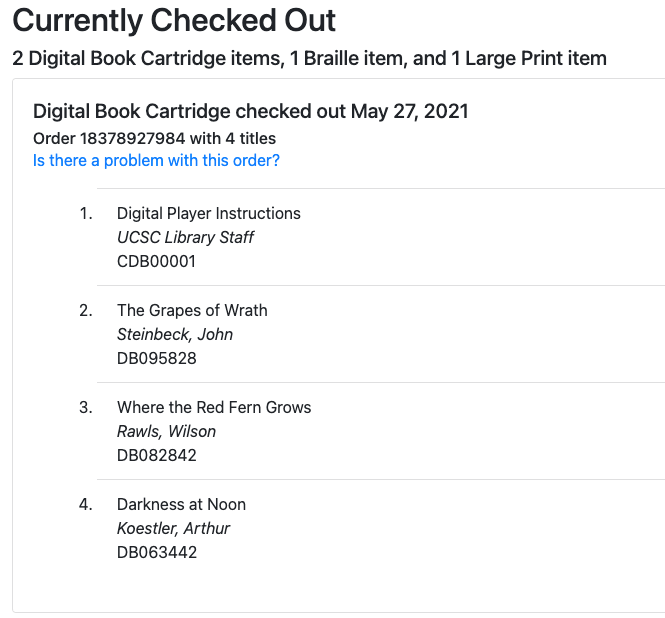
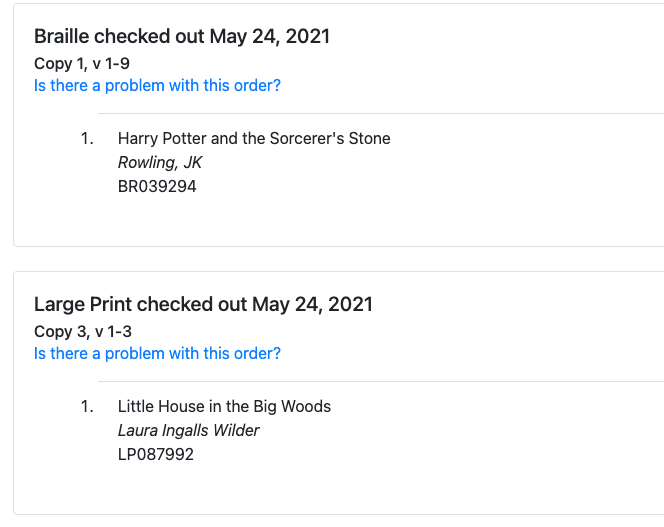
A link to report a problem with the order will give Patrons the option to let library staff know if there was a problem. We are working on what this will do – either send an email to a staff member or to send an alert in KLAS.
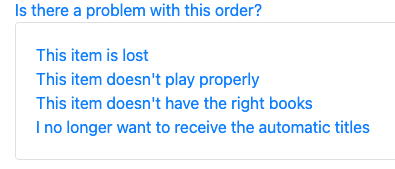
Upcoming Shipments:
The Upcoming Shipments page will show a Patron what is about to be sent to them, in some cases what is assigned (Scribe) or what has just been checked out (Gutenberg).
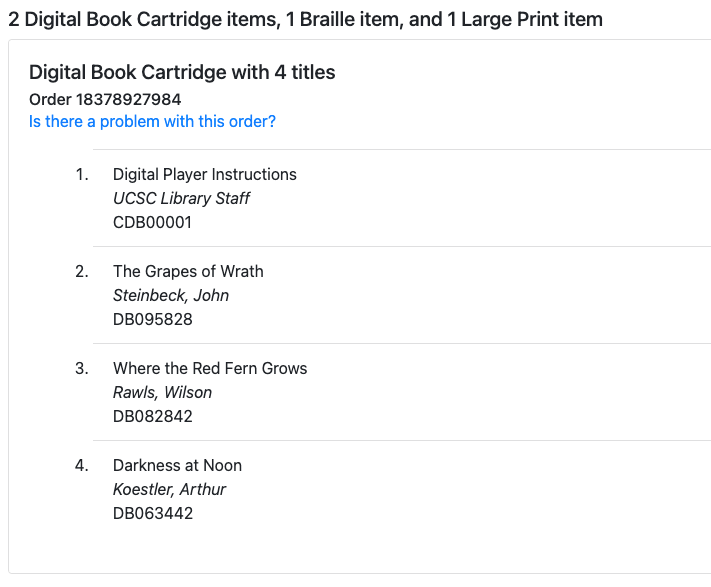
We are going to include the Service Queue somewhere in this menu. For now it is placed in the Upcoming Shipments page, but that could change. Patrons will be able to select titles and move them to the top or bottom of the queue, or remove them.
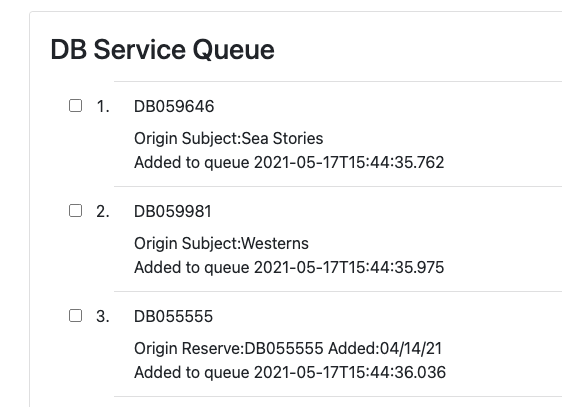
Reading History:
The Reading History page will become a searchable page. Patrons will be able to perform a search (just like a regular OPAC Catalog search) in the Reading History page, and any results returned are books the patron has read – both Has Had and Has Now books will display.

From the search results, Patrons will be able to apply some filters to further limit their results, for example they can choose to show or remove a particular subject or book format.
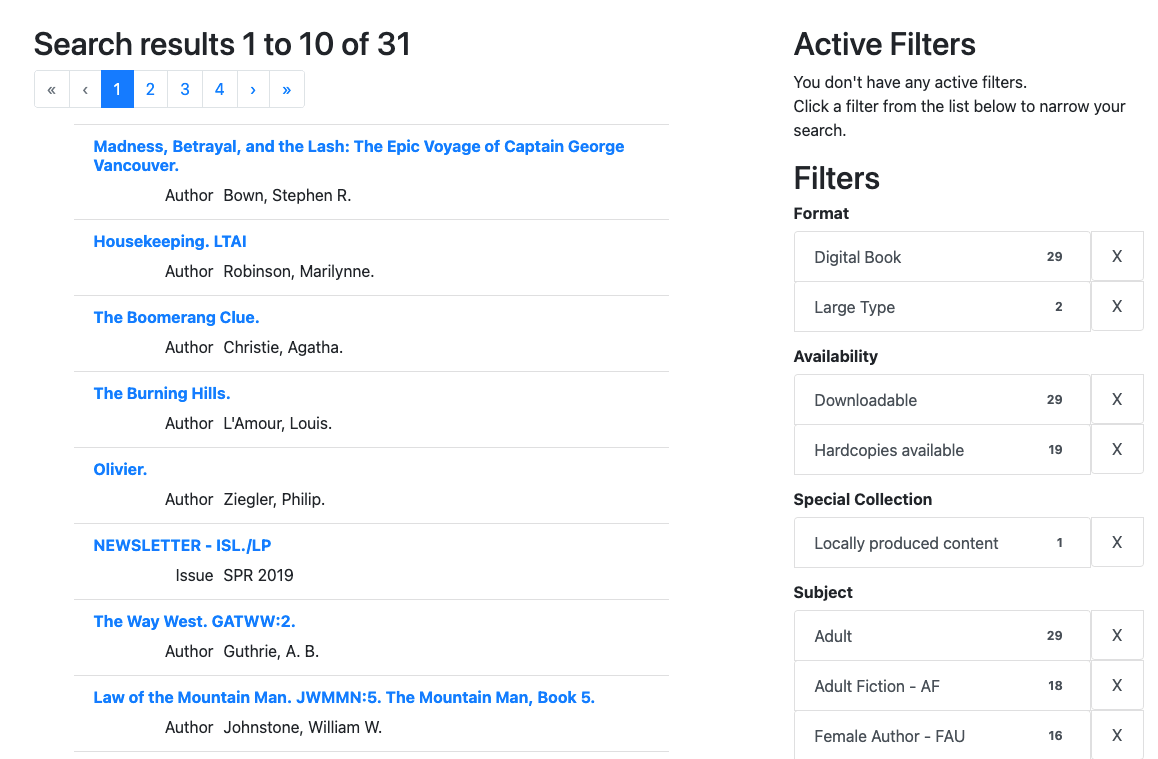
Book Requests:
The Book Requests page will show Patrons any requests or reserves they currently have and allow them to filter on some criteria to help limit results. They will be able to filter by book number, title, author, and a date range that they requested the book. The Patron will be able to select books and have some options. There will also be an option to add the book to the Service Queue. This option will be used if the patron has interest in reading that book soon, but not necessarily wanting to receive it next.
For patrons on physical book service, the Rush option will continue to either assign an available copy of a book or place a reserve on it and send that book to the patron as quickly as possible. For Duplication patrons, the Rush option will move the request to the top of the queue and place a high priority on the book, ensuring the patron receives it on their next duplication cartridge. There is also an option to remove a request.
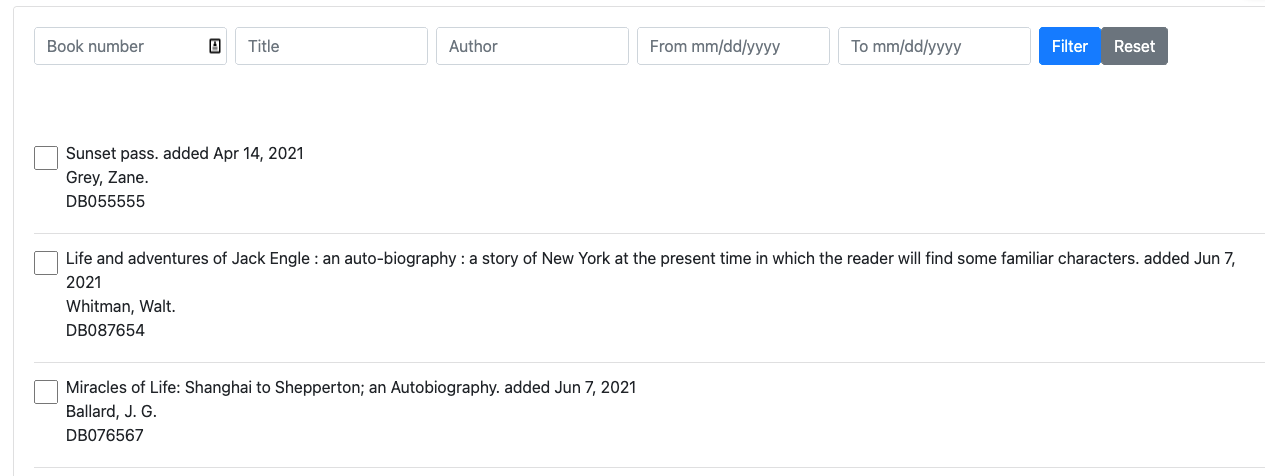
We hope you enjoyed this peek at what we’re working on! If you have feedback you’d like to share about the OPAC and possible future enhancements, please let us know in the comments or via email so we can make sure the new version of the OPAC meets your patrons’ needs as much as possible.
Conference Wrap-up
ExpiredThe 2021 KLAS Users’ Conference is over... but if you didn’t get to all the sessions you hoped to (or if you just miss us already) the online event portal is still open!
You can revisit any session page to view the recording. Also, be sure to scroll down to the bottom of the session page to download the chat transcript, slide deck, and any other handouts. The chat features are still live as well, if you have any Private Messages you haven’t answered yet or want to ask additional questions of our presenters. If you aren’t ready to put your headphones back on yet or need a month’s break from PowerPoint before you can stand to look at another slide, that’s fine too—the event portal will be there for you until March 2022.
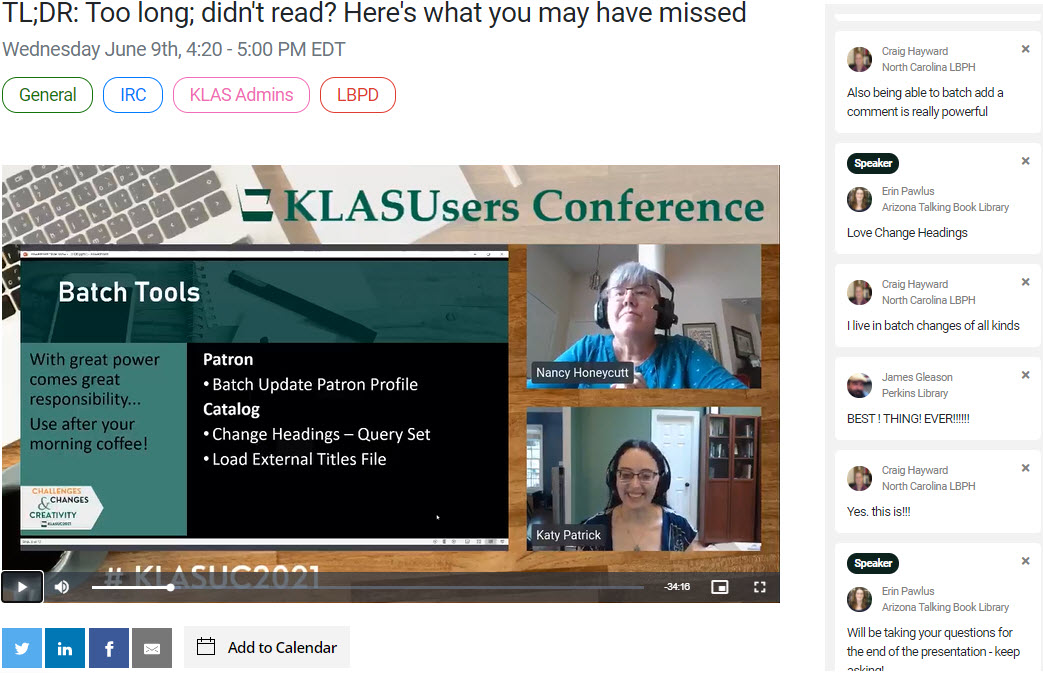
In addition to reviewing the conference content, keep an eye on your inboxes for a follow-up survey. This information will be especially valuable this year, since this was our first-ever online conference, and since the Users' Group will be considering whether to hold virtual conferences again in the future.
In the meantime...
Thank you! Thank you! Thank you! to everyone who attended the conference, and especially to those who presented a session, moderated a roundtable, or just joined in the discussions. Your contributions are so valuable, both to the KLAS Users’ community as a whole, and to us as well. In the final count, we had 261 attendees and 44 speakers (including Keystone staff) for our 38 conference session.
I hope you came away from the conference with new ideas and a better understanding of KLAS. On Keystone’s side, we have a long to-do list and a ton of excitement from hearing how you use KLAS, where we can make things better, and what your priorities are.
While I’m sorry I didn’t get to grab dinner or drinks with any of you, or gather around the coffee dispenser to rev up for the day, I’ve still come away from the conference with the renewed enthusiasm stemming from really seeing how your work impacts others. You are all out there doing amazing things, and I’m so glad we get to be a part of and help support it.
Finally, if you have questions or need assistance with anything you learned at the conference, don't hesitate to use the Support button and let us know! We know you all had a ton of new info thrown your way, and we're happy to help make sense of it all wherever needed.
All attendees of the 2021 Online KLAS Users' Conference will access the conference via PheedLoop's Virtual Event Portal. Here, you will find opportunities to network with speakers and other attendees, browse, search, and add sessions to your personal schedule, access all sessions and their related resources such as PowerPoint presentations, handouts, etc., and more!
Lobby
First, let's take a look at the Lobby area. Here you will find the public and private chat functions, recent event announcements, our virtual photo booth, and more.
The page is organized into four columns:
- Main menu: use this to navigate the conference
- Social area: the Event Feed will display social media posts that tag #KLASUC2021. Need a great selfie for that conference post? Launch the photo booth for a fun background - it's not quite the same as travel photos, but we hope it'll make you smile.
Finally, the Private Chats widget is hanging out at the bottom of the column. You can use the Private Chats feature to follow up with peers after a session, reach out to a new attendee to introduce yourself, or otherwise get to know each other. The widget will stay in place as you navigate the site, so you can use it from anywhere. Start new Private Chats from the recipient's speaker or attendee profile. - Announcements: watch this area for any posts as things come up during the conference.
- Lobby Chat: Get that "around the coffee station" feeling by chatting with all your fellow attendees here (you'll need to supply your own coffee or tea though). Also, don't miss those icons right above the lobby chat!
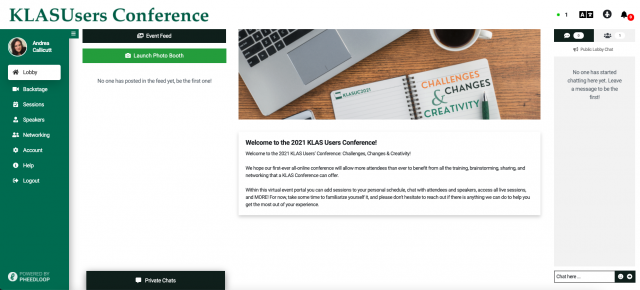
Finally, there a couple important things in the top corner. In the upper right of the screen, you will find notifications, language features, accessibility controls, and a count of total attendees currently online. Use the accessibility icon (a circle with a person's silhouette) to bring up the accessibility menu, where you will find preset profiles and a bunch individual controls.
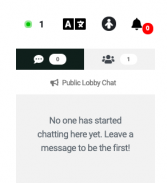
Backstage (speakers only)
Next on the main menu, speakers will find the "Backstage" menu option. If you are presenting a session using PheedLoop's Meet & Stream, go here to start the session. If you're presenting in Zoom or using a pre-recorded session, there's no need to use the backstage. Make sure you schedule a dress rehearsal / practice session so you know where to present your session from, and you're comfortable with all the back-end "stuff."
Sessions
The sessions area displays a list of all the conference sessions, with an expanded view of the selected session to the right, then finally the session chat.
Session list: You can search for sessions or use any of the preset filters (including day, track, speaker, personal schedule, and live now) to browse the list. Use the calendar icon to access the advanced schedule views. As you find sessions that interest you, add them to your personal schedule by selecting the plus sign next to the session title.
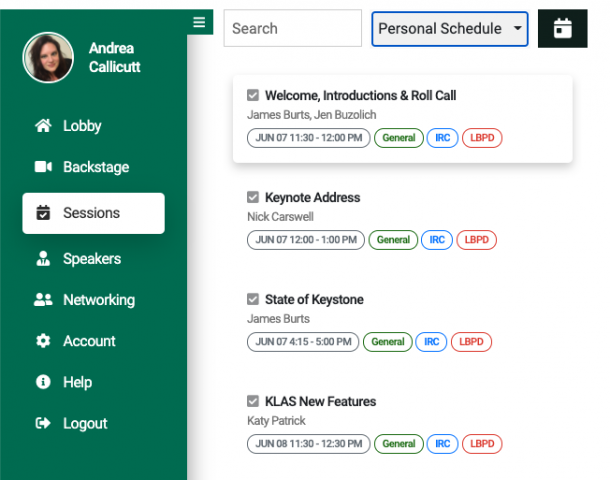
Session Details: This is where you will attend the session when it goes live! You can also share it via social media or email, or add it to your digital calendar (Outlook, etc).
Session Chat: The session chat box has the same look and feel of the lobby chat, but is specific to that session. The chat will remain in place for as long as the event portal is live, not just during the session - so you can ask questions ahead of time or refer back to information shared there even after the session is over.
Speakers
The Speakers area is just like Sessions--but for people. You can browse or search the list of conference presenters, see their bio and other info, review the sessions they're presenting, and even start a chat with them.
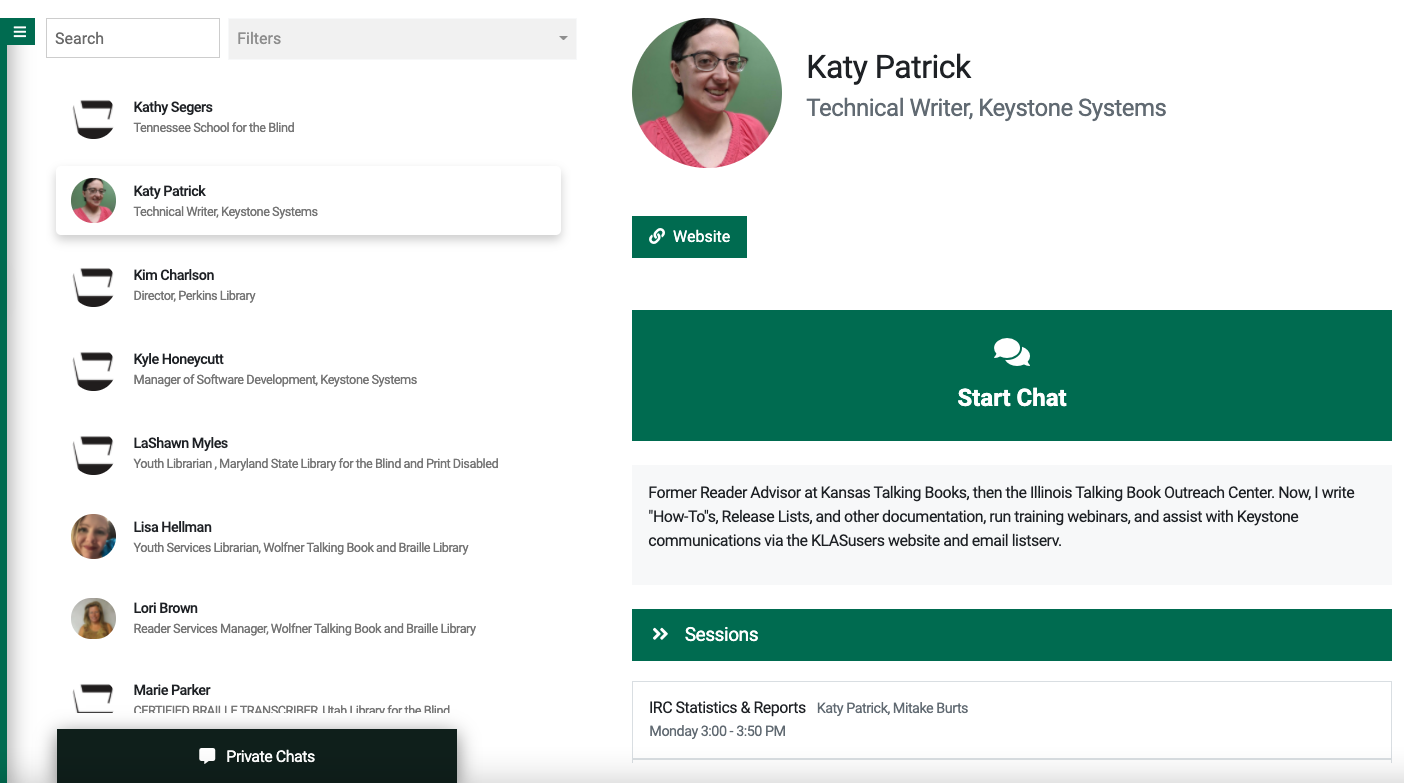
Networking
Networking is a great place to connect with other attendees. Here, you can find all conference attendees' profiles. There are also options to join in or create a group chat around a specific topic. Finally, you can send a private message to any fellow attendee (which you can both view and reply to in the Private Chats widget).
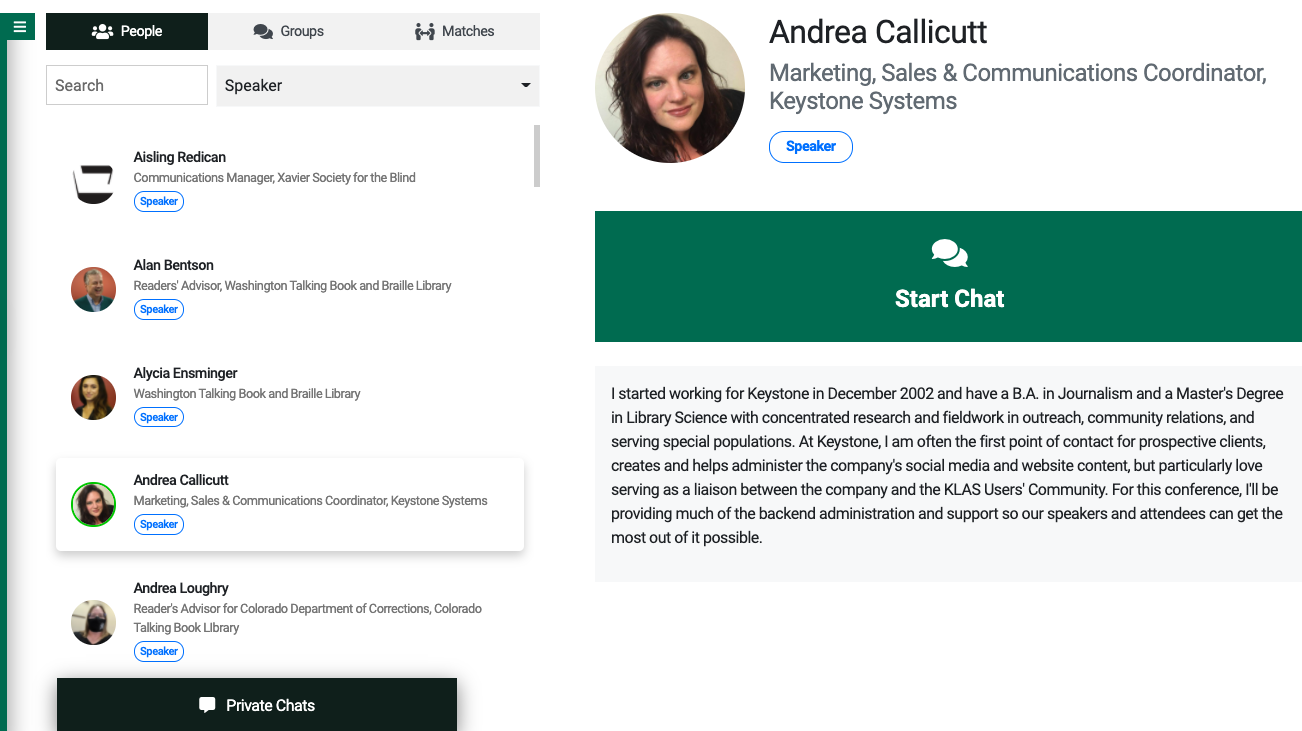
Account
You can view attendee profiles in Networking--but where do they come from? From the attendees themselves! Go to the Account menu item, and here you will be able to edit and add all the info you need to - your profile picture, everything other attendees see when they access your profile, and files you want to share. There's also controls for how you receive event notifications and the option to change your password.
Please take the time to fill in your profile, so your fellow KLAS users can get to know you!
Don't feel pressured to share any info that you don't want to, but some things to consider adding: your pronouns, what your role is at your organization, how long you've been using KLAS, and links to social media you use professionally. Finally, as you can see, the photos are never shown very large, and it can be very helpful to put a face to the name. A simple headshot is best! However, if you decide not to share a real photo, a pet or something iconically "you" will still help other attendees recognize and remember your profile.
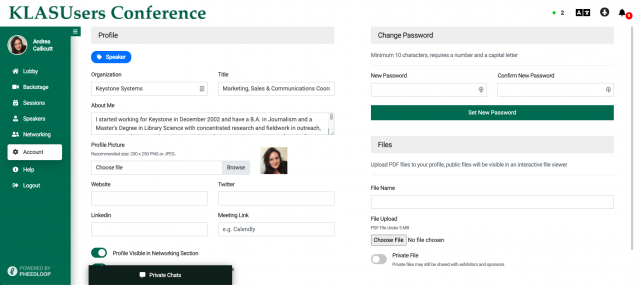
We hope this brief tour of the KLAS UC 2021 Virtual Event Portal will help you get acclimated and have the best experience possible during our very first fully online conference! We're so excited to see you all there!
With the Duplication on Demand KLAS Users' Roundtable occurring this afternoon and the upcoming 2021 KLAS Users' Conference, we feel it's an excellent time to update you on the status of duplication equipment installation at various KLAS libraries. So, let's take a look at which libraries already have their equipment and who is pending for each system.
Scribe Installations and Status
First, we're excited to share that we've resolved the issue that was holding up the production of new Scribes! The solution is in final testing and we expect to resume shipping out Scribe systems very soon. If you are not yet listed below, please contact James Burts () or Keystone's Customer Support Team () to inquire about and / or order your Scribe.
Current Scribe Installations |
||
Library |
Code |
Status |
| North Carolina Library for the Blind & Physically Handicapped | NC1A | Complete |
| New Mexico Library for the Blind and Print Disabled | NM1A | Complete |
| Arizona Talking Book Library | AZ1A | Complete |
| Idaho Talking Book Library | ID1A | Complete |
| Alabama Regional Library for the Blind and Physically Handicapped | AL1A | Complete |
| Braille Institute of America Library Services | CA2A, CA2B, CA2C |
Complete |
| Maryland State Library for the Blind and Print Disabled | MD1A | Complete |
| South Dakota Braille & Talking Book Library | SD1A | Complete |
| Xavier Society for the Blind | Complete | |
| Vermont Department of Libraries, Special Services Unit | VT1A | Complete |
| Miami-Dade Braille & Talking Books Library | FL1C | Complete |
| California State Library - Braille and Talking Book Library | CA1A | In Progress |
| Braille Institute of America - remaining Subregionals | CA2+ | In Progress |
| Florida Braille and Talking Book Libraries | FL1A,+ | In Progress |
| Illinois State Library Talking Book and Braille Services | IL1A | In Progress |
| Perkins Library (Massachusetts) | MA1A | Ordered |
Gutenberg Installations and Status
While the plan to roll out Gutenberg implementations to two NLS network libraries per month beginning in February 2020 was delayed due to COVID, Gutenberg Installations are back underway, so let's take a look at where things stand now. If you have questions about any of the below information and / or if you're interested in getting on the schedule for future KLAS+Gutenberg deployments, contact David Perrotta (, Steve Prine (), and Keystone's Customer Support Team ().
Current Gutenberg Installations |
||
Library |
Code |
Status |
| Colorado Talking Book Library | CO1A | Complete |
| Georgia Library for Accessible Statewide Services | GA1A | Complete |
| Oregon Talking Book and Braille Library | OR1A | Complete |
| Nevada Talking Book Services | NV1A | Complete |
| Minnesota Braille and Talking Book Library | MN1A | Complete |
| San Francisco Public Library - Talking Books and Braille Center | CA1C | Complete |
| Indiana State Library - Talking Book and Braille Library | IN1A | Complete |
| Washington Talking Book & Braille Library | WA1A | Complete |
| Utah Library for the Blind | UT1A | Complete |
| New York State Talking Book and Braille Library | NY2A | Complete |
| New York Public Library - Andrew Heiskell Braille and Talking Book Library | NY1A | Complete |
| Wolfner Talking Book & Braille Library | MO1A | Complete |
| South Carolina State Library - Talking Book Services | SC1A | Complete |
| Oklahoma Library for the Blind and Physically Handicapped | OK1A | Complete |
| Wisconsin Talking Book and Braille Library | WI1A | In Progress |
| Delaware Library Access Services | DE1A | Up Next |
| Ohio Library for the Blind & Physically Disabled | OH1A | |
A look at the KLAS roadmap
ExpiredKLAS v7.8 is coming!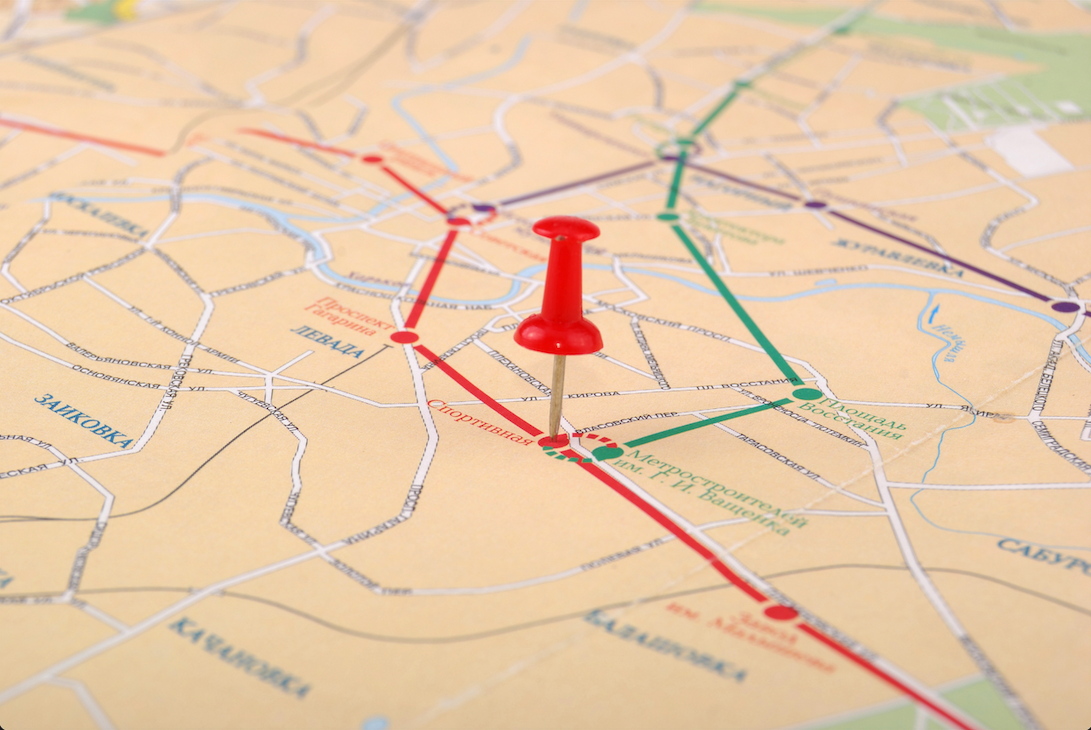
After two years of small updates, we’re really close to bidding farewell to KLAS v7.7 and rolling over to v7.8. This will not be a big change at all from your perspective, but I want to give you a heads-up about what’s coming and why.
The first KLAS v7.8 release will likely include other fixes and improvements, but the update triggering the version change should be completely invisible. That update is to Open Edge (OE), the framework and programming language we use to build the KLAS interface. The new version of OE will provide us access to new options for programming KLAS, keep us up to date and allow us to get any bug fixes on that end of things. However, nothing should change to the look and feel of KLAS. How it runs, what is available for users, and how we support it will all remain the same.
To make sure the update to the back-end doesn’t introduce any problems on the front-end, we’ll be doing a lot of rigorous testing. We’ll also rely on feedback from our Early Release customers even more than usual so we can be sure we haven’t missed anything. Fortunately, we do not anticipate any changes or problems. This won’t be a major conversion (like the one from 7.6 to 7.7), just a big update.
So, in short, v7.8 will be an update for us, but not any different for you. Don’t worry, we’ll keep those bi-weekly small updates coming with all the bug fixes, improvements, and new features we can squeeze into them.
So... whatever happened to v.8?
If you attended the 2018 KLAS Users’ Conference in Idaho, you probably remember testing our prototype user interface for the web-based KLAS v.8. It’s something that we and you were really excited about, so it makes sense that we get questions about it on occasion.
For quite a while, we didn’t have much to say. That’s because, right after the 2018 conference, we realized just how big the need was to get Duplication on Demand up and running at full scale ASAP. We shifted gears pretty hard, switching our attention to: taking Scribe from a proof-of-concept to a fully-realized appliance capable of supporting a library’s full circulation; getting Gutenberg integration in place; and building screens, workflows, and features to support this whole new approach to service.
Additionally, we needed to keep up with the development needs of our IRC/IMC customers, bring new customers online, and keep everything else running. That “keep everything else running” was complicated by the deployment of 7.7 and all the development needed to support it, and a massive server crash that prompted our migration to all cloud hosting.
Unfortunately, the pivot to duplication ate up the time and resources we’d hoped to devote to KLAS v.8. But there’s is good news! With Duplication on Demand finally getting to be as robust and fully-featured as we envisioned, and the needs of our IRC / IMCs lining up with some things we needed to do anyways... we’re finally able to provide an update: we are at work on the foundations of v.8!
To be clear, it’s still a very long road ahead. Building an entirely new UI (informed by the prototypes and user testing from 2018, and everything new we’ve added to KLAS since) is a huge undertaking requiring a lot of development resources. However, the other major task will be the need for the UI to communicate with the database storing all of your information by way of APIs. Finally, the APIs needed to be built and implemented so that they allow existing programs in KLAS to function alongside any user interface we build moving forward—we know from painful experience that we can’t rebuild all of KLAS at once and release an entirely new interface with everything you need ready and working on day 1.
We’re excited to say this key building block, the suite of APIs that will provide the machine-to-machine communications needed for v.8 to function, is now underway!
You may have noticed these APIs cropping up in Release Lists this year, and more are coming. For now, IRCs that maintain student data, orders, and catalog info in more than one system are using and will be using these APIs to integrate with third party systems, but the beauty of APIs is that once they are in place, any compatible system can use them. The programming we’re doing now to integrate with other systems will be the thing that allows us to integrate with the browser-based KLAS v.8 in the future (while still allowing the v.7 interface to be used during the transition).
How long will this take? It’s really hard to say. It ultimately depends on what other development is needed, what new needs crop up which we haven’t anticipated, and what resources open up for us to take this on. But getting the APIs in place is incredibly important foundational work, and we’re really excited to finally get them on the front burner and in progress.
As announced yesterday (and clearly visible from visiting the site) KLASUsers.com has undergone a pretty big redesign and refresh. We've added new features and functionality, but also reassessed how we organize content to make it easier to find and use. Some of the most important things to know about the redesign are:
- The new Knowledge Base & KLAS News menu items
- Logged-in users can now comment on articles
- Using article tags to find what you need
- The site's enhanced search functionality
- The log-in function is now available from every page, and won't redirect you from whatever you are currently viewing
- A Support button on all pages gives you a quick shortcut to contact Keystone Customer Support anytime you need help
Today I want to talk about the first four on the list...
Knowledge Base & KLAS News
All still-relevant articles from the old klasusers.com are still available, but the old menu items have been collected under the new overarching categories of Knowledge Base and KLAS News. This simplifies the Main Menu, and should keep you from needing to guess whether the info you need is in a document or a recording.
The main page for each of the new menu items will display the most recent articles in that general category, and a link to the related subcategories can be found at the bottom of the page.

Under Knowledge Base, you will find two subcategories:
- Recordings, including general and customer specific training and webinars
- Documents, including MARC Record Updates, Release Lists, and quick reference
KLAS News' subcategories include:
- Key Notes Blog posts
- Events
- KLAS Users' Group info
The five most recently added or updated articles in each category are also listed in the site's footer, so you can easily jump to the new content from any page. We hope this reorganization will help you get to the content you want quicker and easier, without needing to remember where things are filed away.
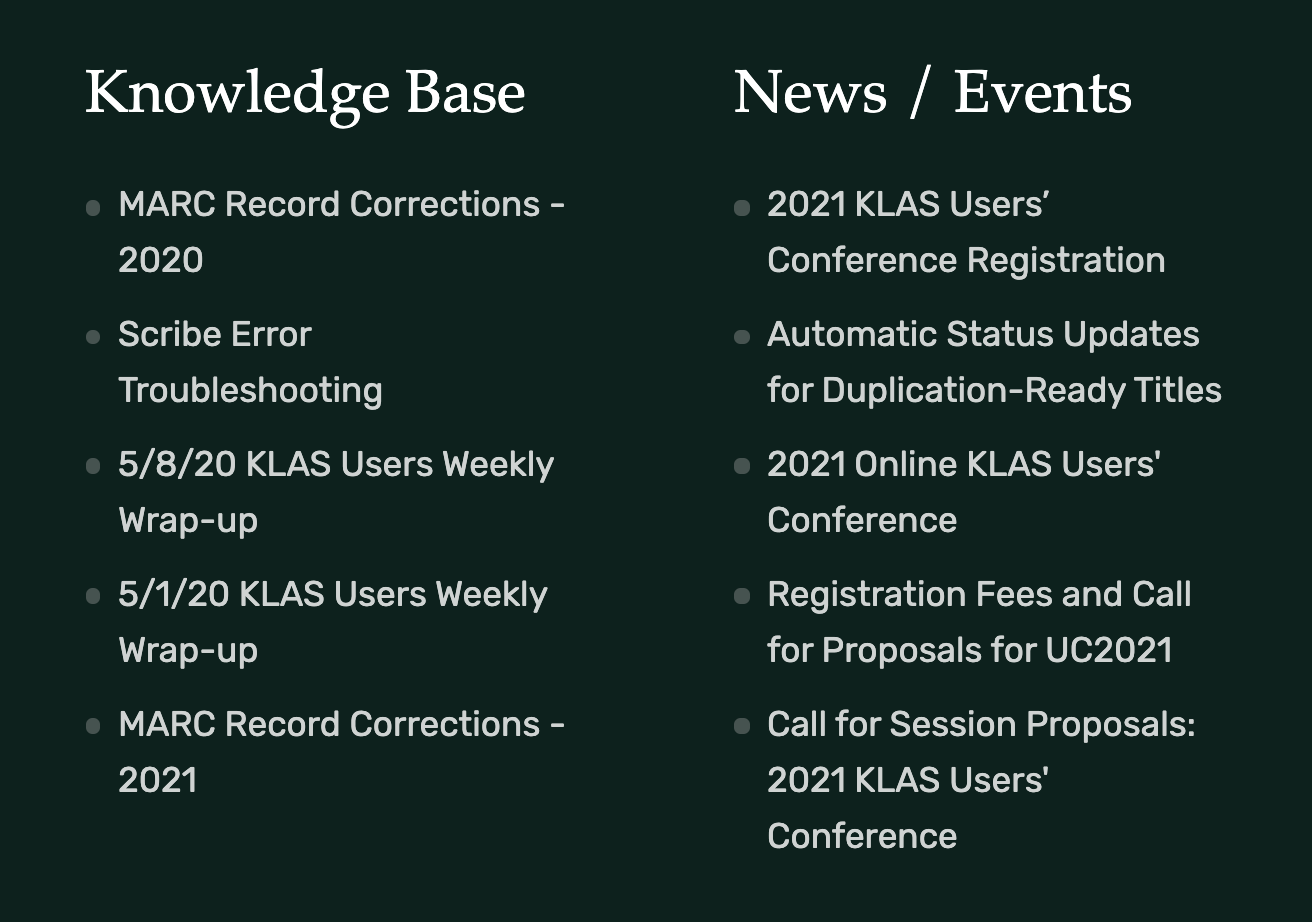
Article Commenting
We're excited to see how this new feature adds to our site! Logged in users now have the ability to comment on any article on KLASUsers.com.
If you aren't logged in, you can still view any posted comments, but to add a comment you will need to log in, either from the comments section or the link at the top of the page. All comments can be viewed from the article page itself, or in the forum, so it's easy to find the latest discussion! New comments are visible right away with no approval necessary, although our site administrators can moderate comments if needed.
We hope you will find this a great new way to ask for more information or provide feedback--we'd truly love to hear when you find an article interesting or useful, or if there's something you'd like to add to the discussion. We challenge you to make this the first article you comment on!
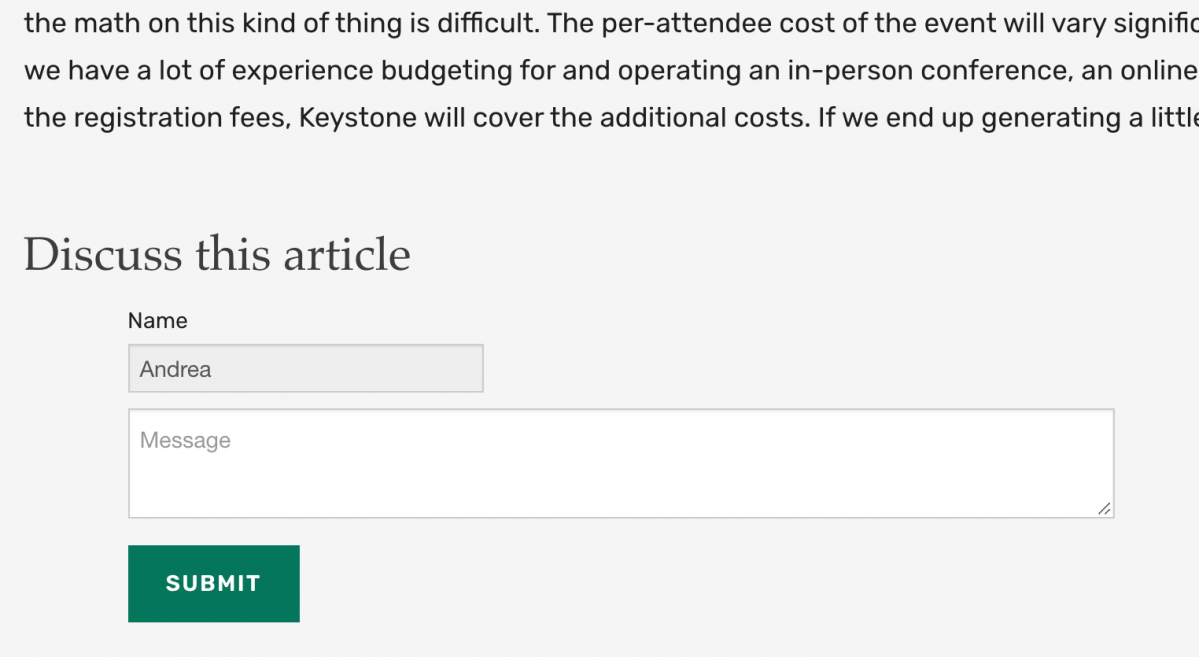
Article Tags
You will now see subject Tags listed on all article previews and at the top of all full articles. These words or phrases are ways of categorizing articles and such with similar content. For, example you can select the "duplication on demand" tag to see a list of all articles with that tag applied.
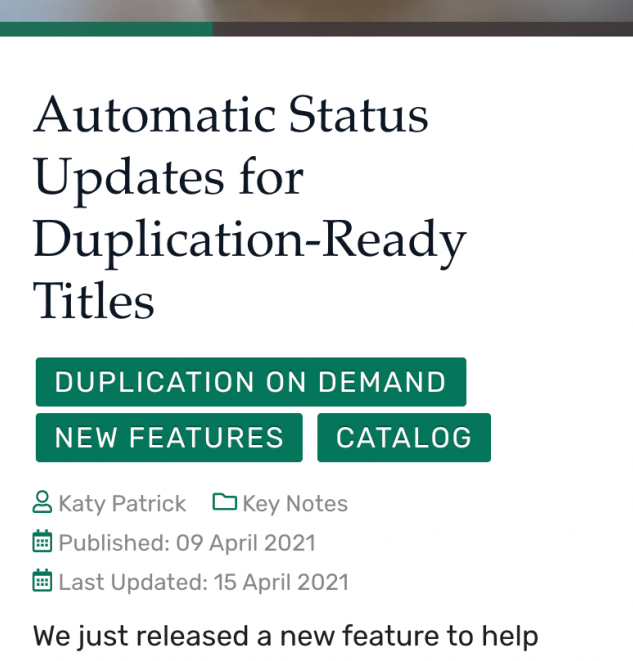
We have actually been tagging articles all along, but the new site puts them "front and center" so you can easily spot them or quickly click through to a category you want to browse more of. We've also reviewed the tags we used previously to streamline them and make sure we're using the feature in the most useful way. If you find examples of misapplied or missing tags, please let us know. Also, don't be afraid to speak up if you feel we need to add a new tag!
Enhanced Search Capabilities
This might be the thing I am most excited about (unless it's article comments... we're really excited about the comments). I love when I can easily create and execute a search to find just what I'm looking without any muss or fuss. The search bar allows you to seamlessly search for anything from anywhere with a simple keyword search.
You can also choose to employ additional Search Options such as looking for all (or any) instances of the word or the exact phrase as typed to narrow down the results to exactly what you want to see. You can also choose how you want your results displayed. Options include: Newest or oldest first, most popular, alphabetical, etc. If you only want to look in a certain area of the site, there's also options to limit your search that way. Finally, you can also control how many results you see on each page using the "Display #" drop-down.
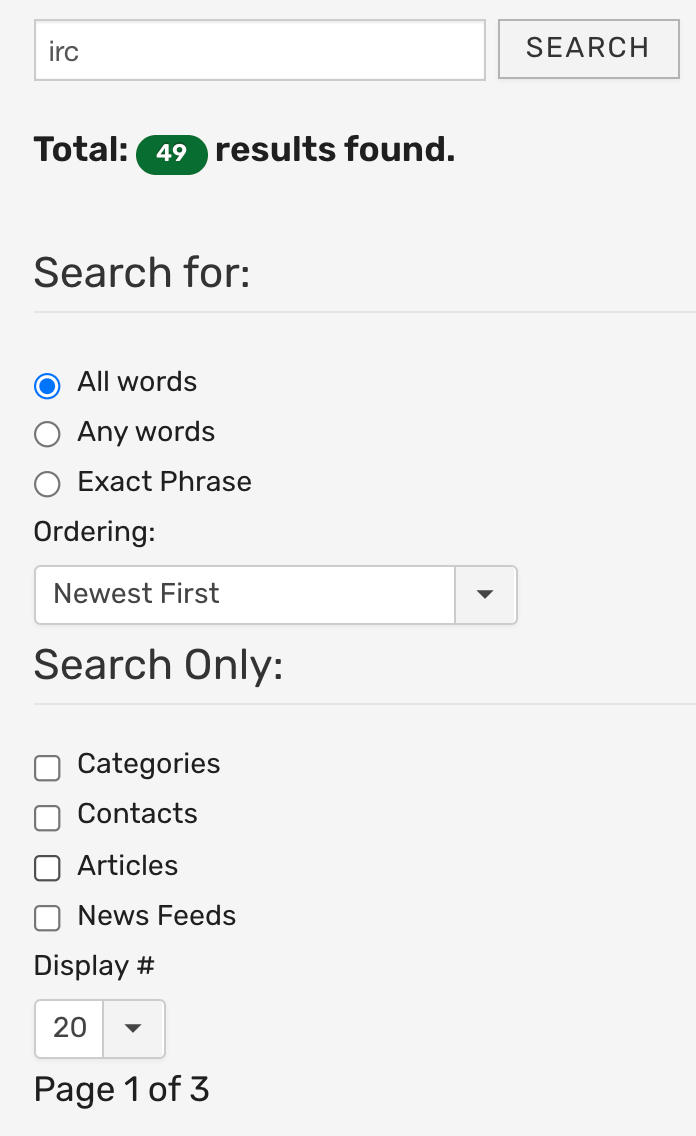
We know y'all are busy, so the faster and easier it is to find what you need, the better. We hope the new site search will allow you to jump right to the info you need.
Final Notes
We've put a lot of thought and effort into the refresh, but with increasing "technical difficulties" from the old site, we went live before we had the chance to test the site as well as we would have liked. If you encounter any problems with the new site or spot something we missed! In particular, if something is not accessible, please let us know! The reorganization and the big changes to the look and feel of the site may take a little getting used to, but we hope you'll all agree that this is a big step forward for KLASUsers.com.
As announced on the e-list yesterday, registration is now OPEN for the 2021 KLAS Users’ Conference! The deadline to register is 8:00 PM Eastern / 5:00 PM Pacific Friday, June 4.
To make this year's process easier than ever, we chose to use the PheedLoop platform to handle registration and even credit card payments. Yes, you can pay via a credit card this year! If you prefer or need to still pay by check, you can also download an invoice directly from the registration page.
- $25 for individual attendee tickets
- $50 for small group tickets (2-5 persons)
- $100 for large group tickets (6-10 persons)
Group Ticket Purchases: If you're purchasing more than an individual attendee ticket, one person from your organization can register, select the combination of the tickets needed, and include each individual attendee's name and contact info. Each listed attendee will be emailed their ticket info separately. An organization can purchase whatever combination of individual, small, and large group tickets makes sense for the number of staff they want to attend.
Example: To purchase one Large Group Ticket for 10 people, select 1 "Large Group Ticket" with your name listed as the "Attendee". Then proceed through the payment and checkout options and then add the other 9 persons as "complimentary ticket" holders when prompted to do so.
Follow this link to begin your 2021 KLAS Users' Conference attendee registration or read on for more information about the registration platform.
1. Registration Category
Begin the registration process by selecting “Attendee” – since our conference does not have sponsors or exhibitors, this is the only registration category that will be listed.
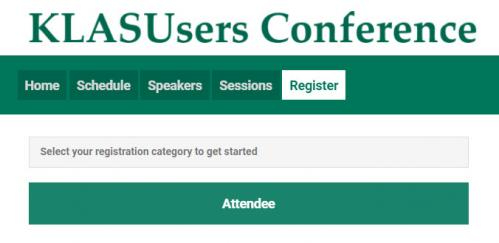
2. First Attendee Info
You will then need to fill in details for the first person registering for your library. If you will be purchasing for a group, there is an option to add additional attendees’ information later on as complimentary ticket holders. For now, just enter your own information, or pick someone from the group that will be attending, then proceed to checkout.
There is an optional field if you would like to give us a heads-up about any accessibility requirements. One reason we chose the PheedLoop platform to host the conference was its extensive suite of accessibility options, but don’t hesitate to let us know what you may need. We want everyone to have full access to the conference!
On the second page, please select what pronouns your fellow attendees should use for you during the conference. You can select multiple options if desired (for example, if you are comfortable being called either “she” or “they” and want people to use both options for you).
3. Ticket Selection
Next up is the ticket page, where you can select the ticket or tickets you are purchasing for your organization. For example, if you want to register a total of 5 people for the conference, add 1 “Small Group” ticket (which will cover your registration, plus up to 4 additional individuals, listed as complimentary ticket holders). For 15 people, select 1 Small Group ticket and 1 Large Group ticket then proceed to checkout. And of course, if it’s just one person, scroll down to “Individual.”
Once you have added at least one ticket, fields will be added to designate the Ticket Owner--just leave the info that is brought in with your own details. There will be a place later in the process to add the info for the additional people you will be registering under a group ticket.
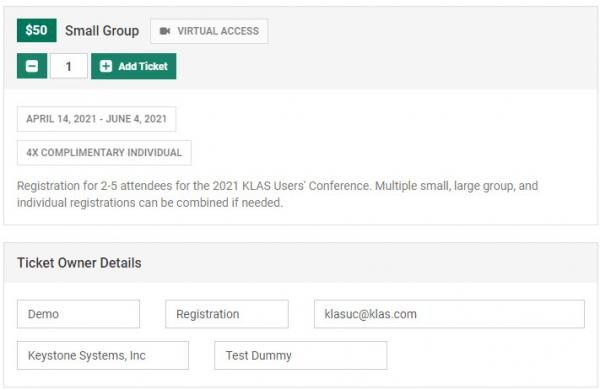
4. Payment
You can pay by credit card, or select “Other Payment Method” to generate an invoice and pay by check. You can download once your registration is submitted, and it will be emailed to you as an attachment as well. The invoice will include information on where payment should be sent, and what information to include with it.
When you have selected all desired tickets and your payment type, use the Checkout button to proceed.

5. Success Page
Congrats, you are not officially registered! If you selected "Other Payment Method," your registration will be pending until payment has been received.
If you've included any group tickets in your registration, the success page will allow you to register the additional attendees included in the ticket price. It does not collect as much info for them as it does for the original ticket holder, but they can fill in additional info in their profile later on.
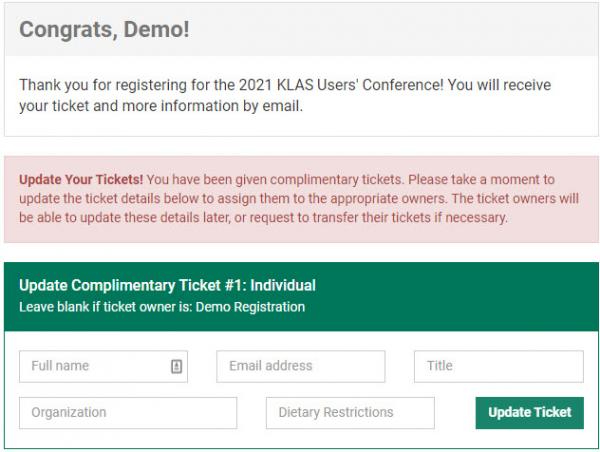
Note that the fields include "Dietary Restrictions" by default, but since this is a virtual conference, we don't need to know that! Feel free to use that field to report any Accessibility Requirements instead.
Be sure to use the Update Ticket button for each ticket once you've assigned it to the proper individual. You do not need to assign any of the complimentary tickets to the person whose info you already filled in--that person is already registered.
Finally, the success page also includes the option to download your invoice (if you selected Other Payment Method) or your receipt (if you paid by credit card).
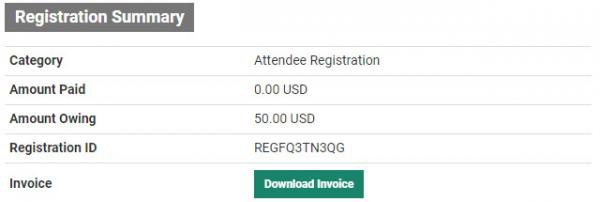
Questions?
If you have any problems with or questions about the registration process, please let us know at ! The occasional wrinkle is inevitable, with this being our first-ever online conference, but we will do everything we can to make it a smooth and easy experience for our attendees.
Thanks for your patience as we get this all worked out!
We just released a new feature to help Duplication-on-Demand libraries keep their catalogs up to date!
From the 7.7.50 Release List:
You can now choose to have titles automatically updated to an Active status when you add an eDoc, just as you can have titles make themselves Active when you add the first physical item.
But let’s talk a little bit more about what this can do, and who will want to use it.
We expect this will be primarily for libraries using Duplication on Demand, and especially the ones who are (or will soon) be going collectionless. If you don’t have physical copies of anything or have very few physical copies, it only makes sense to make everything you can duplicate “Active.”
Even if you still have a physical collection, if most of your patrons are getting DoD will they be confused that some titles are listed as Active and some are Download Only? Once you zero out your copy allotment, do you want new titles to linger in “In Process” status long after you start duplicating them for patrons?
If any of the above has you thinking, “yes, I want to use this feature!” here’s what to think about...
- What title statuses should update when they get an eDoc?
- What status should they update to?
- What about the back catalog?
What title statuses should update when they get an eDoc?
Open up the catalog and look at the list of Title Statuses. Are there ones that shouldn’t be over-written, like Withdrawn? If there are titles you purposefully removed from your collection (Ex: outdated medical information or obsolete guides to the internet) we don’t want to accidentally resurrect them.
If you have a Special Order Only or similar status, do you want to keep those titles segregated? Or if you’re duplicating at full steam, are you ready to fold the ones you can duplicate back into Active?
When you’re ready, send us the list of statuses that should be updated by this feature.
What status should they update to?
I mostly talked about the feature updating duplication-ready titles to Active, but that isn’t your only option. Any status other than Withdrawn can be duplicated, so it won’t cause problems if you do want to keep these titles under a different status. You could do an “Active – Duplication” or “Active for Digital” title status. Or, you can put them under “Download Only” if you have that labeled clearly for your OPAC (something like “Available for Download or Books on Demand”). And, of course, if you’re changing things to Download Only, that shouldn’t also be in your list of statuses to be updated.
Figure out what makes the most sense for your collection and your patrons, and tell us what status titles getting their first eDoc should update to. You can also let us know if you want to set up a new title status or re-label any of the existing ones on your OPAC.
What about the back catalog?
Once you’ve set both your statuses to be updated and the status to update them to, those rules will automatically apply whenever a title gets its first eDoc. But what about any titles that already have an eDoc but are lingering in a no-longer-accurate status?
We have a program we can run through your batch manager to clean those up! We’ll want to run it sometime when you aren’t doing anything in the catalog module, to avoid any conflicting record locks. Most likely, we’ll run it overnight or early in the morning before you get to work.
Just bear in mind that it can be messy to try to undo this kind of thing, so do your best to be sure about the changes you are making before telling us to run the cleanup.
Below you will find the latest udpated about the 2021 ONLINE KLAS Users' Conference. Please let us know if you have any questions or need additional information.
2021 KLAS Users' Conference Website & Attendee Portal:
Theme: Challenges, Changes & Creativity
Overview Schedule:
- KLAS UC 2021 Overview Schedule with Sessions - PDF
- Overview schedule in spreadsheet format on Keystone's Google Drive.
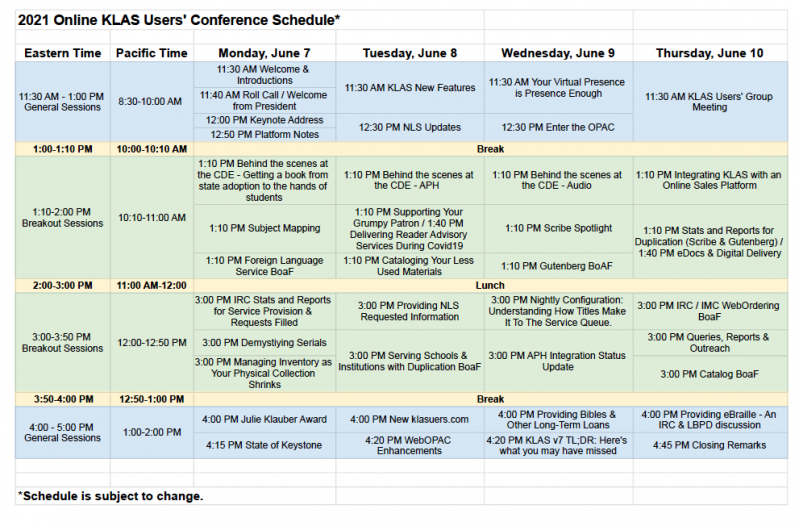
Format:
To give our attendees the best experience possible, we will be using the PheedLoop online event platform. The Planning Committees and Users' Group Officers had an opportunity to see the event participant side of the platform and were impressed with the features for networking, session scheduling and access, and extensive accessibility options.
Using this platform, conference attendees will be able to attend sessions live or review the recordings later on, message each other privately or in subject groups, and even share files with their fellow users. While it can't fully replicate the feeling of all sitting around the same table, we hope that this format will allow us to bring as much of the full conference experience as possible.
Registration:
Go here to begin your 2021 KLAS Users' Conference attendee registration.
The deadline to register is 8:00 PM Eastern / 5:00 PM Pacific Friday, June 4. If you have any questions about the group registration process, check out this step-by-step for a detailed explanation with screenshots.
Conference Registration is now open! To make this year's process easier than ever, we chose to use the PheedLoop platform to handle registration and even credit card payments. Yes, you can pay via a credit card this year! If you prefer or need to still pay by check, you can also download an invoice directly from the registration page.
- $25 for individual attendee tickets
- $50 for small group tickets (2-5 persons)
- $100 for large group tickets (6-10 persons)
Group Ticket Purchases: Example: To purchase one Large Group Ticket for 10 people, select 1 "Large Group Ticket" with your name listed as the "Attendee". Then proceed through the payment and checkout options and then add the other 9 persons as "complimentary ticket" holders when prompted to do so. Each listed attendee will be emailed their ticket info separately. An organization can purchase whatever combination of individual, small, and large group tickets makes sense for the number of staff they want to attend. For example, a library can purchase one small group and one large group ticket for a total of $150 to cover up to 15 attendees.
Registration fees go towards the conference platform and video streaming services. This is not intended to be a profit-generating event! That said, the math on this kind of thing is difficult. The per-attendee cost of the event will vary significantly based on how many attendees we have, and while we have a lot of experience budgeting for and operating an in-person conference, an online conference is new to us. If we find that we undershot on the registration fees, Keystone will cover the additional costs. If we end up generating a little extra, it will be used towards the next conference.
We have an important update about KLAS UC 2021: finalized registration costs are now available! Our first online KLAS Users' Conference will occur June 7-10, 2021. Check out the "2021 KLAS Users' Conference Take 2 blog post for the proposed conference schedule.
Conference registration costs are:
- $25 for Individual attendees
- $50 for small groups (2-5 persons)
- $100 for large groups (6-10)
An organization can purchase whatever combination of individual, small, and large group registrations makes sense for the number of staff they want to attend. For example, a library could purchase one small group and one large group registration for a total of $150 to cover up to 15 attendees.
Conference registration fees will go towards the conference platform and video streaming services. This is not intended to be a profit-generating event! That said, the math on this kind of thing is difficult. The per-attendee cost of the event will vary significantly based on how many attendees we have, and while we have a lot of experience budgeting for and operating an in-person conference, an online conference is new to us. If we find that we undershot on the registration fees, Keystone will cover the additional costs. If we end up generating a little extra, it will be used towards the next conference.
We have been working hard to plan an online conference just as worthwhile as an in-person one, with convenience and a lower cost to make up for a lack of local cuisine and charming wildlife (I’m not the only who misses those lizards that were all over Palm Beach...right?). These registration costs will cover the technology needed to make attending sessions, presenting, and networking with your fellow attendees easy. And the group rates will hopefully allow libraries to take full advantage of the absence of travel costs and allow more staff members than ever to attend.
Call for Session Proposals
If the low registration costs and/or group rates do open the door for you... please consider not just attending, but presenting as well!
Now that the registration costs are finalized, we have reopened the Call for Session Proposals until Friday, March 26.
Anyone is welcome to present, so don’t feel like first-time attendees or KLAS rookies need to sit it out. Everyone has something they can share with their fellow users!
Presenting online has its own challenges, but it has its benefits as well. You can use own equipment that you are already comfortable with. You don't have to project across a loud room or struggle with jet lag, and you can even have your dog, cat, or spouse handy for moral support.
We will provide all presenters with an optional template for PowerPoint, information and training on the conference platform, and practice sessions if you want to test your connection. You also have the option of pre-recording your session if you prefer! If you’d rather not be on-the-spot, you can record your presentation in any video editing software, and send us the recording to “broadcast” during the scheduled time. Attendees will be able to view the pre-recorded session together, with you answering questions or joining the discussion in the text chat.
You are welcome to ask a friend to present with you, gather a few coworkers for a group discussion, or request Keystone provide a “KLAS Expert” to back you up. You could also facilitate a discussion during a Birds of a Feather session on anything from Reader Advisory Services to the APH Census. It’s okay if you don’t know all the details of your presentation yet: proposals can be as vague or specific as you’d like. Our excellent Programming Committee can always work with you to fine-tune things as needed.
This year’s Programming Committee chair Erin Pawlus says: “Presenting has been a positive experience for me – I enjoy sharing tips and tricks on my favorite KLAS functions like the Reader Services Queue, and I often learn a thing or two from the other attendees. It’s very collaborative. Since we are going virtual this year, those who typically are unable to attend the in-person conferences will also be able to share their stories and successes, and make valuable connections with others in the KLAS community at the same time!”
If you have any questions or concerns about presenting, please feel free to contact Erin Pawlus () or me ().
No need to be shy! If there’s something you’d like to share with your fellow users, please fill out the Session Proposal form.
It's March 2021. By mid-month last year, all of Keystone's staff started working remotely full time for an undetermined amount of time. Personally, I never thought I'd still be working in my home office across the desk from my husband a full year later! We made changes to how we met as a staff, set expectations for communications and interactions with our coworkers and customers, and started writing blog posts with tips & tricks about remote work with KLAS and how users might continue to serve patrons.
We initially thought we'd be back sometime early that summer. When that no longer seemed likely, we began making adjustments to how we offer KLAS Admin Training, helped more libraries move to Duplication on Demand, and shared a blog series from libraries about the impact of COVID on their operations. Check out the COVD-19 Keynotes Blog Posts to Date from July 2020 to see the initial ones we wrote and those authored by KLAS Users.
Then it seemed sometime in the fall might be possible, but positive numbers and hospitalizations started going up again and we chose to continue working from home. We attended the 2020 APH and NLS conferences online and eventually decided (in conversation with the planning committees) that our own 2021 KLAS Users' Conference will also occur virtually. Even with the choice to continue working remotely, we still had staff who contracted the virus--fortunately, not being in the office kept the rest of us safe and healthy. After his recovery, a January 2021 Key Notes blog post shared John Owen's decision and experience donating plasma with COVID antibodies to try and help others.
After this tumultuous year, some of our customers are back working in an office, others are still working remotely, and plenty have some mix or balance between the two. Here at Keystone, we're still working to support all of our users' efforts to continue serving their patrons no matter where they are. In fact, in just the past couple of weeks, we've gotten some great questions and tips from KLAS Users that we thought might benefit others in similar situations.
Erin from CA IRC is a JAWS user who shared her experience using KLAS on her laptop. She says, "I have discovered that working on a personal laptop at home is not always conducive to things working like they do at work. My laptop has function keys that share the F keys at the top of my keyboard. While using the F11 and F12 keys when I was attempting to set up Supertabs (in order to correct where my cursor will originate in my find screens), it would raise and lower the screen brightness. However, I found that the Supertabs were still set up after this happened. I just thought if anyone else thought their laptop wouldn't work because of this, it indeed might!" We're relieved that the extra functions sharing her F keys didn't keep Erin from using Supertabs and navigating KLAS with JAWS.
David from Minnesota's Machine Lending Agency sent an inquiry to Keystone Customer support wanting to know "if it is possible to use KLAS to track the computers we loan volunteers for in-home recording. We have 75, so a little cumbersome for a spreadsheet." The answer is YES it is! To do so, Nancy set up with a Patron Type for the volunteers and an Equipment record for the recording computers, and sent along workflow instructions to keep the volunteer records out of PIMMS.
Do you have something you've found that makes working from remote easier, were there changes to your library's policies and procedures to help continue service over the past year, or do you have questions about how KLAS can help you better adapt to a new situation, such as tracking equipment lent to volunteers? We'd love to answer questions, host discussion on the forums, or share info in a blog post. We've all had to get creative, and asking questions and sharing information has helped us all adapt and overcome to the best of our abilities.
We're still doing all we can to try to provide our customers with quality software and service, though how we do so has definitely changed. I think we've all made some positive changes and learned a lot in the past twelve months. At this point, I'm very excited that we now have three vaccines available and the pace of immunizations is picking up, but there's still no clear timeline or picture of what Keystone staff's work environment will look like in the next year. One thing that's sure: we'll still be here (wherever "here" is) to help!
The Duplication Service model opens up a ton of new possibilities for serving patrons, and with that comes a whole host of new edge-cases, problems, opportunities, and workflow questions. Today, let’s look into one of those new workflow questions: what do you do when a Title is Withdrawn?
First up, what exactly do I mean by “Withdrawn? For this post, I’m referring to Titles NLS has recalled due to Quality Control or other concerns as well as Titles with a status of “W / Withdrawn” in the KLAS Catalog. Most points will be the same or pretty close for NLS recalls, Locally Produced titles you have withdrawn for quality or timeliness (such as a corrupted file or a voting guide from a previous election), or for NLS titles you have decided to no longer offer (such as computer “how-to” guides from the early 90s).
What happens in KLAS?
For Gutenberg libraries, when NLS recalls a title the file is pulled from the Gutenberg hardware. Overnight the e-Doc sync in KLAS will spot the missing file and report the e-Doc as “stale” in the PCC Load Summary. (If you want to keep an eye on your e-Doc sync and do not yet get a daily PCC Load Summary email, let us know!) The title can still be added to patron Service Queues or included in a Duplication Order—however, it cannot be duplicated, because Gutenberg no longer has the file! So when NLS notifies you that a title is being recalled, it’s important to go into your KLAS Catalog and either make the title status Withdrawn or delete the e-Doc. That will prevent KLAS from letting the title onto any Dup Orders.
For titles you chose to withdraw on your own, you can proceed as below.
For Scribe libraries (or Gutenberg libraries doing a voluntary recall), you have more choice about how to proceed. The file is not automatically pulled so, as long as you leave the record in an active status, you can continue to duplicate the title as you decide how to proceed. When you are ready to stop all duplication, you should update the catalog record to make the title status W / Withdrawn. At that point the title may still be on some patron’s Service Queues, but it can no longer be added to any new ones or included in a Duplication Order. The Sanitize Queue function then removes the title from patron Service Queues during its next routine sweep.
So, what are your options?
You can always immediately shut down duplication of a title by changing the title status to W / Withdrawn. However, if you want a little wiggle room, you do have other options.
For a voluntary recall (or if using Scribe) you may leave a sub-par but functional title active, add the No Autoselect (NAS) subject heading to the record, and include a cautionary note in the title field. This is a good option for reissued titles you want to provide to patrons with a strong Narrator preference, but don’t otherwise want to send. This won’t fully withdraw the title, but will keep it from being sent by Subject preference, and guide Reader Advisors to which version of the title they should send.
You may also use the NAS option as a stop-gap for titles in the process of being re-recorded. For example, NLS recently pulled A DB 100980, Time for Mercy by John Grisham, in favor of replacing it with the unabridged version. If you want to offer your patrons the option of getting the Abridged version instead of waiting for the replacement (and if you have a Scribe, since the file was pulled from Gutenbergs automatically), you can add NAS to the Local Subjects, and add “Abridged version” to the title.
However, you probably also want to either pull it from patron’s Service Queues where it’s been auto-selected, and/or contact patrons to see if they want to wait for the Unabridged version.
Patrons with Queued Title Report
This is where a brand-new report comes in: Patrons with Queued Title. This report (which will be included in KLAS v7.7.47, our next update), will fetch a list of every patron with a particular title on their Service Queue and/or in a Duplication Order.
Use this report to remove the withdrawn title from queues where it was automatically selected, then reach out to patrons who requested it ask if they want the current version, or want to wait for a re-record.
Or, when browsing the report results, you might find few to no patrons actually requested the title, and decide to update the title status to fully Withdraw it right away.
Always feel free to ask!
Whew... this was a long one. I hope it helps you understand how Withdrawn titles affect Duplication Service, what happens automatically in KLAS, and your options for handling them. However, feel free to ask us any time a situation like this comes up, and you aren’t quite sure what will happen or how to proceed. After all, this is still a relatively new approach to patron service! We’re here to share the technical details and help you determine your best course of action.
And, of course, we hope the new report comes in handy!
Today was Day One of the KLAS IRC Symposium being held at Keystone's office in Raleigh, NC. There are eight IRC / IMC staff members from five different states attending the Symposium with the goal of learning more about using and administrating KLAS from Keystone trainers, helping to provide feedback on future KLAS features and funcitonality, and networking with other IRC KLAS users to share tips and tricks.
Scenes from our first IRC Sympoisum:
Our small training room is set up waiting for attendees to arrive.
We also set up a lab area with access to all our attendees' databases so they can practice what they learn from our instructors.
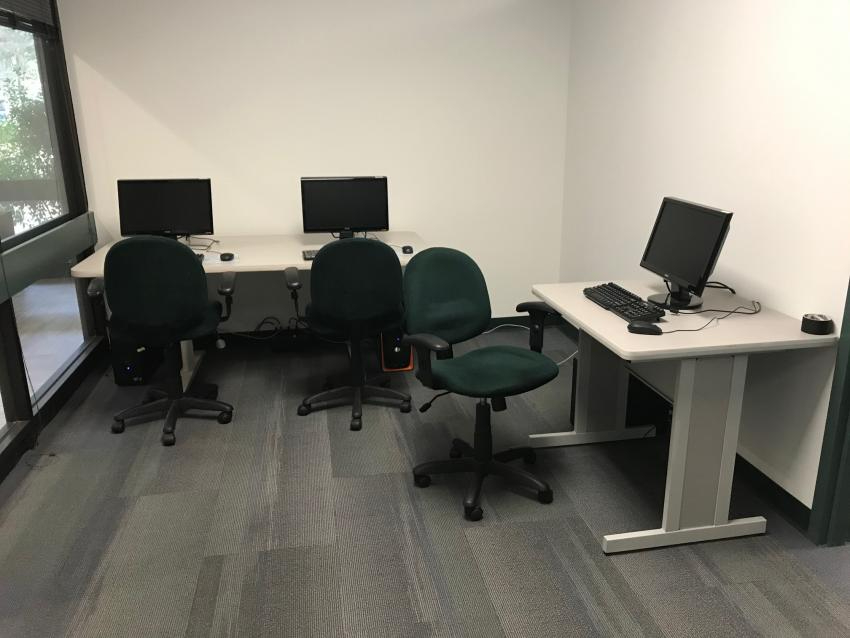
Nancy starts the day talking about KLAS WebOPAC and WebOrdering.
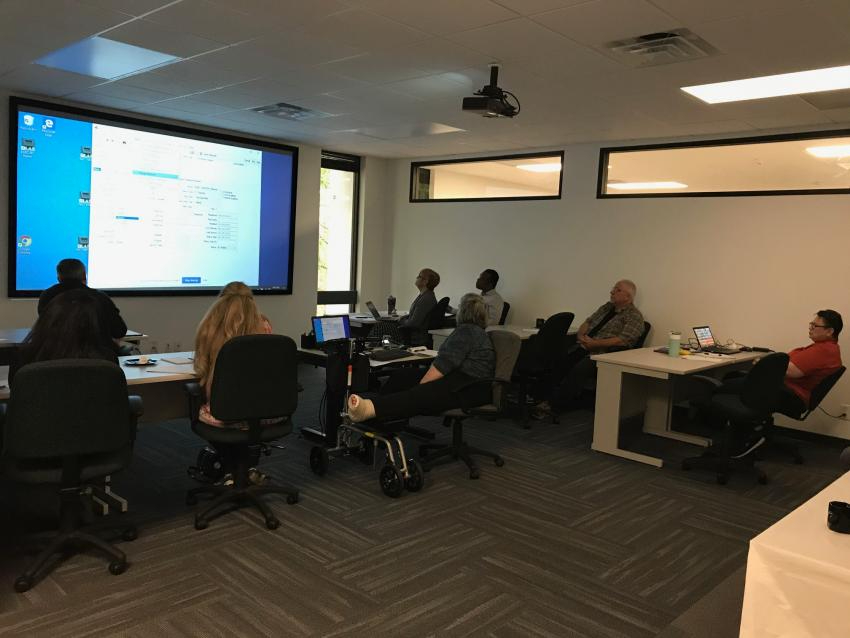
Great questions being asked and discussion happening as Nancy instructs our attendees.
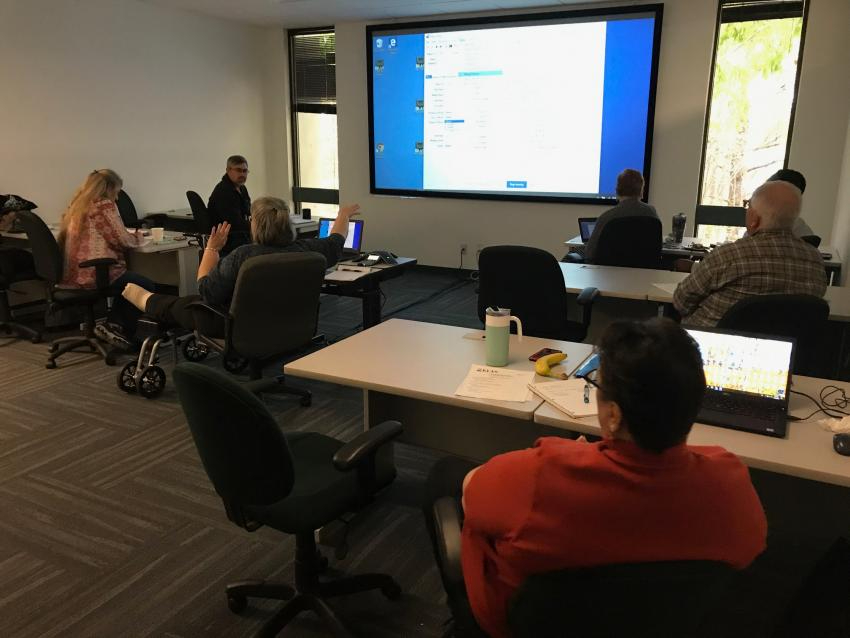
As always, Keystone will feed you into submission.
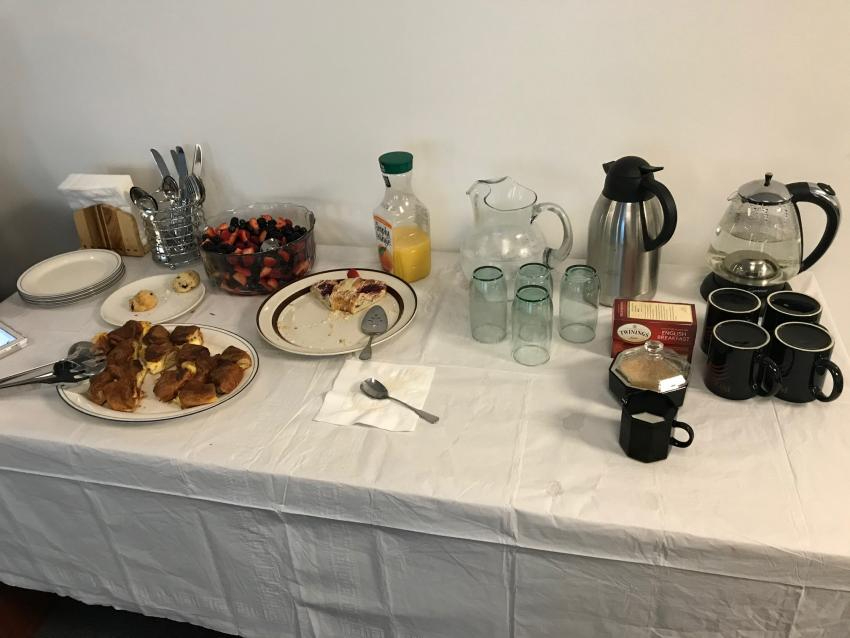
After a full morning of learning, you need to take a break. We enjoyed a delicious lunch together at Relish where we took in the gorgeous autumn weather and got some more time to chat and learn from one another.
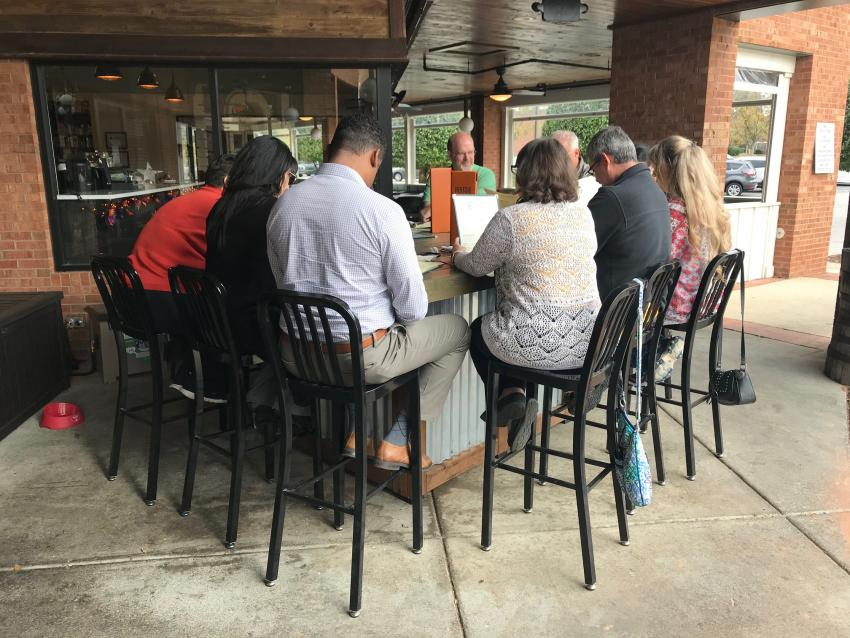
Here's looking forward to the rest of the IRC Symposium!
First, we want to thank everyone who responded to our 2021 KLAS Users' Conference Planning Survey. We heard you, and we're moving forward based on your input.
The Program and Logistics Committees, the KLAS Users' Group Officers', and Keystone staff have been working diligently to figure out how to shift the conference to an online event. We're really embracing our conference theme of "Challenges, Changes & Creativity"! In the past few weeks, we've shifted our planning timeline and had discussions about dates, schedule, event management software and services, registration costs, session proposals, and more.
Today, we're excited to share that the 2021 KLAS Users' Conference will be June 7-10, 2021 with the below proposed schedule for each day:
| Eastern Time | Pacific Time | Session Type |
| 11:30-1:30 PM | 8:30-10:00 AM | General |
| 1:00-1:10 PM | 10:00-10:10 AM | Break |
| 1:10-2:00 PM | 10:10-11:00 AM | Breakout |
| 2:00-3:00 PM | 11:00 AM-Noon | Lunch |
| 3:00-3:50 PM | Noon-12:50 PM | Breakout |
| 3:50-4:00 PM | 12:50-1:00 PM | Break |
| 4:00-5:00 PM | 1:00-2:00 PM | General |
To give all our attendees the best experience possible, we're planning to use an online event platform. We've evaluated a number of different ones and currently plan to use PheedLoop. Last week, the Planning Committees and Users' Group Officers had an opportunity to see the event participant side of the platform and were impressed with their available features for networking, session scheduling and access, and extensive accessibility options.
Using this platform, conference attendees will be able to attend sessions live or review the recordings later on, message each other privately or in subject groups, and even share files with their fellow users. While it can't fully replicate the feeling of all sitting around the same table, we hope that this format will allow us to bring as much of the full conference experience as possible.
Individual and group registration rates are still being finalized and will be announced soon.
We're hoping more KLAS Users will be able to participate in this year's conference than ever before, since there is no travel required! See you there!
There were days that cast it into doubt, but some good things did happen in 2020! Let's have a look at some of them from this very website (with lots of links to get caught up if you missed something in the tumult).
We had a very successful series of webinars, covering both LBPH and IRC topics of interest, and including Keystone-led, User-led, and roundtable formats. Additionally, we had the chance to meet with y'all at the APH online conference and at the NLS online conference. We also transitioned KLAS Administrator's Training to an online format with a renewed and refreshed curriculum to better meet the needs of our Admins.
Back in January, we introduced the Scribe Mini! This little guy can store the entire digital collection, can either run a full Scribe Tower, or be used as a stand-alone device at a front desk or outreach location. On the other side of the hardware aisle, Teresa Kalber of the Colorado Talking Book Library, one of the first KLAS libraries to implement Gutenberg, shared their experience in the Hot off the Press blog series.
Then Covid took over the news and turned our expectations for the year on end. Even when things were hard though, KLAS Users put in their time and effort to help each other, including by sharing their experiences, lessons, and strategies as we all adjusted to lock-downs and quarantines.
Despite the difficulties of the year, business continued as best it could, including the need to track and report on statistics. In Get to Know the Circulation Report, I shared some info to help you make friends with one of our most powerful reports.
Finally, we continued to refine and improve our Disaster Preparedness and Recovery processes, ensuring that we can respond to anything and keep you all up and running as best as possible.
Despite the uncertainty ahead our excellent user committees continued to plan the 2021 KLAS Users' Conference, balancing the need for flexibility with the planning timeline. Watch for the latest information and the results of the recent planning survey coming very soon!
Over on our other website, we re-launched KLAS.com with an all-new (and much improved) look and feel! We were so happy with the results, in fact, we're actively working to provide KLASUsers.com with a similar refresh.
Here's to 2021! This year is shaping up to be plenty weird and challenging in its own way, but we do we expect it to bring an easier-to-use and more modern KLASUsers.com, and plenty of new content to keep you all informed and empowered as users!
Donating For Good
ExpiredIt was only a matter of time. In December one of our own, John Owen, contracted COVID-19 and spent two weeks off of work fighting it. Thankfully he recovered and has not experienced any of devastating or long-term side effects.
Troubled by the lack or therapeutics available to COVID patients John jumped at the chance to help one of the most vulnerable communities. As soon as he was able, he donated his plasma that now contains the antibodies that can help those who are critically ill have a better chance at recovery.
John said this about his plasma donation:
“I’ve done it once and found out that I can continue to donate plasma every seven days until my annual limit. One small needle prick and an hour in a recliner is nothing compared to the chance that my donations can help critically ill patients have a fighting chance at recovery. This disease is no joke, and I am so thankful that my wife and family have so far been spared.”
Some photos John took during the donation procedure and of his "badge of honor" stickers.
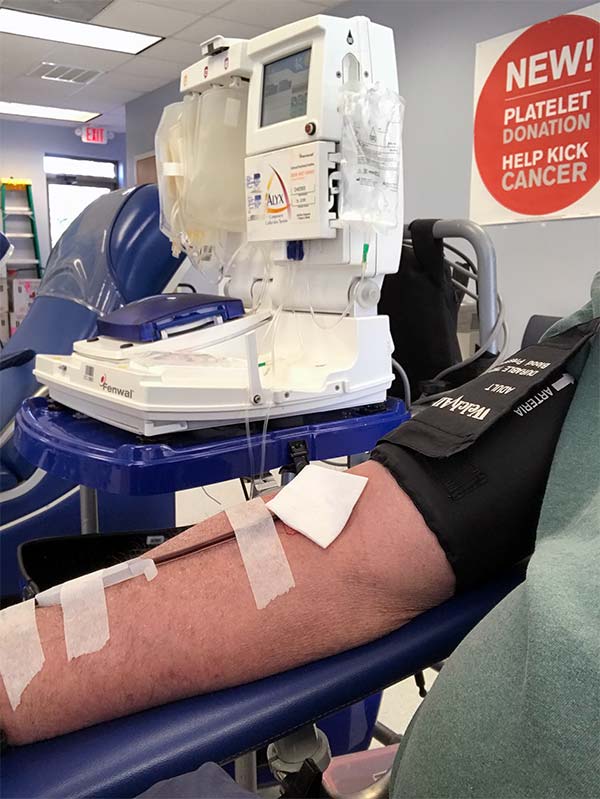
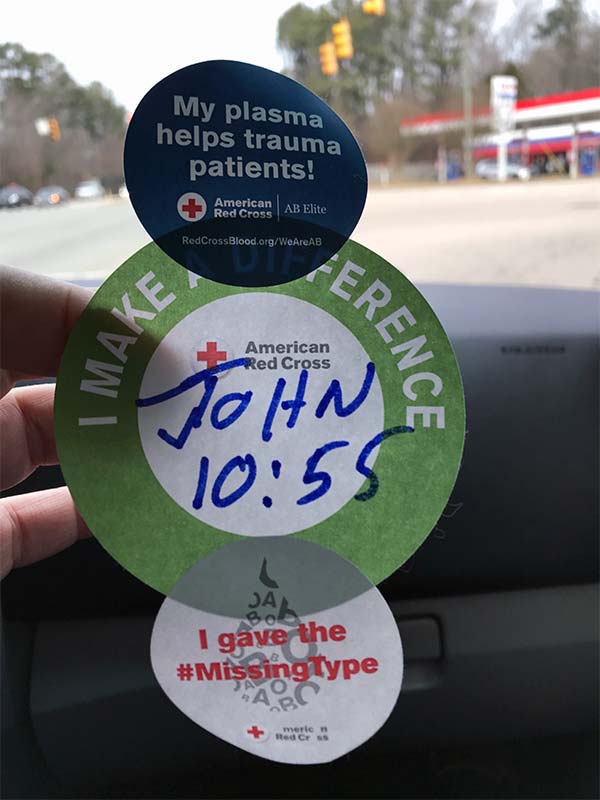
Happy Holidays from Keystone
ExpiredWe wish you a Happy and Healthy Holiday Season! May you in find joy and warmth in the holiday lights and comfort knowing a new year is just around the corner! From our homes to yours...here's to a cheerful holiday and a fresh 2021!
Our office will be closed Thursday, December 24, and Friday, December 25, 2020 in observance of Christmas. Regular support hours will resume on Monday, December 28, at 8:00 AM ET. The office will also be closed on Friday, January 1, 2021 for New Year's. Regular support hours will resume on Monday, January 4, at 8:00 AM ET.
If you need to arrange special support hours for these days, please call or e-mail us as soon as possible.
"Duplication" is the word of the day / week / month / year for National Library Service for the Blind and Print Disabled network libraries. Whether you've already made the fundamental shift to providing duplication on demand materials for your patrons or are still trying to make decisions about how to shift your library to a duplication on demand service model, there's many questions, decisions, and challenges faced during the process.
With this in mind, the KLAS Users' Group Program Committee is providing another opportunity for KLAS Users' to come together in a session focused on this topic. Go ahead and mark your calendar now for the upcoming KLAS Users' Roundtable: Duplication on Demand to be held on Tuesday, December 15 at 3 PM Eastern / Noon Pacific.
Note: We expect this session to last two hours rather than the usual one. Also, we plan to record this roundtable and post it to klasusers.com for later reference.
During this roundtable, three representatives of libraries using Gutenberg and three representatives of libraries using Scribe will each discuss their experience implementing duplication equipment, decisions regarding policy and staff changes, and more! After each shares a brief description of their process, there will be an opportunity to ask questions, discuss issues they've brought up, etc.
Gutenberg Panellists:
- Hope Williams, Nevada Talking Book Services
- Elke Bruton, Oregon Talking Book & Braille Library
- Ricardo Cisneros, San Francsico Public Library - Talking Book and Braille Center
Scribe Panellists:
- Connie Sullivan, South Dakota Braille & Talking Book Library
- Angela Fisher Hall, Alabama Regional Library for the Blind and Physically Handicapped
- Nancy Holt, Idaho Talking Book Library
Before the roundtable...
To help you prepare for this roundtable we encourage you to review Duplication Info Quick Reference page where you will find articles, quick tips, how-to documents, and more related to using either Gutenberg or Scribe. Several of the documents have just been updated to reflect changes in recent versions of KLAS, so make sure to check those dates to make sure you have the most current info!
You can also help our panellists prepare for this session by posting questions to this KLASUsers Discussion Forum post. Of course, day-of questions are also welcome, but posting your questions ahead of time will ensure that we get to them (even if you can't make the session itself) and that the panellists will be able to consider their answers.
Access Info:
Tuesday, 12/15/2020 @ 3pm Eastern Time / Noon Pacific
To connect:
Google Meet Link: meet.google.com/rmv-fgvs-eba
Dial-in audio option:
US +1 575-459-0037
PIN: 950 920 249#
Happy Thanksgiving!
ExpiredWell, it's going to be an unusual holiday season this year, but may you all find some joy and celebration. Even more importantly, we hope you and your loved ones stay healthy.
In these difficult times, we're grateful to be here for all of you. We have a fantastic users' community, and we're looking forward to supporting you through the winter and hopefully to brighter and easier days ahead.
PIMMS Ch-ch-ch-ch-changes
ExpiredToday we wanted to prepare you (with a hat tip to David Bowie) to "Turn and face the strange [PIMMS] Ch-ch-ch-ch-changes," as PIMMS is adding a couple new statuses for Machines.
One will be "Awaiting Repair" which is not big news. However, to accurately get PIMMS up to date for this status this we will need to work with your KLAS Administrator to remap some existing KLAS CorStatus/MatDisp combinations.
The bigger change will be a Machine Status of "Transferring Status". This status will be used whether this is a direct transfer of a machine from one library to another or if the machine is field transferring from one patron to another. We have updated KLAS to add multiple Transfer (TF) Material Disposition codes to support this status.
New PIMMS TF Material Disposition Codes:
- Transferring Out (TFO) -- Machine is in the process of transferring out directly from one library to another. (This is an update of the existing TFO status code.)
- Transferring Out with Patron (TFP) -- Machine is in process of being transferred out with a Patron to another Library.
- Transfer Rejected (TFR) -- Either the Machine transfer or the Patron transfer has been rejected by the Gaining Library
Tranfer Accepted (TFA) -- The machine or Patron transfer has been accepted by the Gaining Library.
Libraries will not need to do any set up for these new codes. They will automatically added to KLAS with the upgrade. Existing machines that are Transferring Out (TFO) will be updated to Transfer Accepted (TFA) if the machine exists elsewhere in PIMMS.
Things to keep in mind with these new PIMMS Machine Transfer Statuses:
- If the machine is tranferring along with a patron, nothing will need to be done to transfer the machine--it will now be included along with the Patron transfer. Also, the library receiving the machine does not have to do anything to add it into KLAS, it will both be automatically added with the patron.
- If a machine should NOT be transferred with a patron, the library needs to remove the machine from the patron's record before transferring the patron record.
- If a machine or patron transfer is rejected, the machine changes to Not Available for Circulation / Transfer Rejected (NAC / TFR) and the patron will keep a Tranfer (T) status. There are new reports in KLAS that can be run to identify machines and patrons with this NAC / TFR status. The library will then need to figure out what they want to do these Machines and / or Patrons.
Please contact KLAS customer support to get help preparing for the Awaiting Repair status or if you have any questions about how the new Transfer Material Disposition are being used / what they mean.
Reports are always a popular topic as a KLAS Users' Conference session, so we thought they'd be a great pick for our next Keystone-presented webinar! I may not be an Intrepid Reporter (like so many 80s heroines...), but I'll be demonstrating some of the powerful reports built into KLAS, fielding questions, and hosting a discussion on what new reports you may like to see added in future versions of KLAS. All are welcome; I'll be aiming to show and discuss reports for both IRC and LBPH users.
Is there a specific report you want to know more about? A reporting or statistics question you want to ask? I'm very happy to receive requests and questions ahead of time! In addition to giving me the chance to research your question, it also ensures I can answer your question for the recording -- even if you aren't able to join us live.
Of course, you're also welcome to do your best to stump me during the webinar itself. If you do, I'll be sure to get an answer to you afterwards.
You'll find all the info you need to attend in the Webinars & Roundtables article. Once the webinar is over, the article will be updated to include a link to the recording. Finally, you may notice on that page that our December webinar is going to be a TBL Users' Roundtable on Duplication Updates! We've assembled a great panel of both Scribe and Gutenberg users ready to share their experiences with you--watch for more info about this on the KLASusers listserve in the weeks to come.
I look forward to "reporting" to you next Thursday, November 19 at 3 PM Eastern Standard Time!
Time for a Refresh
ExpiredWith the KLAS.com revamp successfully launched, we’ve started planning and looking ahead to reorganizing and redesigning KLASusers.com as well.
It’s important to us that this site can serve as a valuable resource for you, as well as a place where the user’s group can come together and collaborate on common issues. The appearance of the site isn’t as important... but we do want it to be pleasant to look at. A much higher priority is that the revamped KLASusers be easy-to-navigate and convenient to use (for all of our users—accessibility will be absolutely required in the revamp). Finally, if we’re able to add in some new features to facilitate user interaction, that’s a big plus!
We have our ideas about how to achieve all of this, but we want your feedback. Drop by Drea’s recent forum post to let us know what you’d like to see in a revamp, if there’s anything you don’t want us to change, or if you have any thoughts or feedback on our ideas below. We hope to hear from you!
A couple of examples of what we’re hoping for in the revamp:
Our current plan is to fold the current Documents and Recordings sections together into a Knowledge Repository (maybe just called "Resources"), so you can find all of the how-to information, downloads, and other "good stuff" without needing to know what format the resource is in. Of course, this section especially will need good indexing and searching.
Another change we’re aiming for is for users to be able to log in from any page and stay on that page rather than being redirected to their profile. This should make it a lot more convenient to access restricted content.
We’d also like to be able to include comments sections on articles, so it’s easy for you to ask questions or provide feedback on blog posts and resource articles without needing to switch to a forum post or email.
A lesser (but still high) priority is for the new version to be easier for Drea and I to administer. That won’t be as apparent to you, but it will help us get new content up on the site quickly. Right now, handling recordings can be especially tricky, so we hope the new site will allow us to more easily post new recordings in a way that will allow you to view them on the site itself and maintain a proper level of security for library-specific recordings that may include patron data.
So how does all that sound? Anything else you want us to be thinking about or try to address in the revamp? Please drop by the forums (since we don’t have that comments section yet) and let us know!
This week's post shares some insider info about our Software Development Project Lead. Read on to learn something new about Brian...
Basic Stats:
Name of Staff Member: Brian White
Year Hired: 2004
Current Job Title: Software Development – Project Lead
Getting to Know You Q&A:
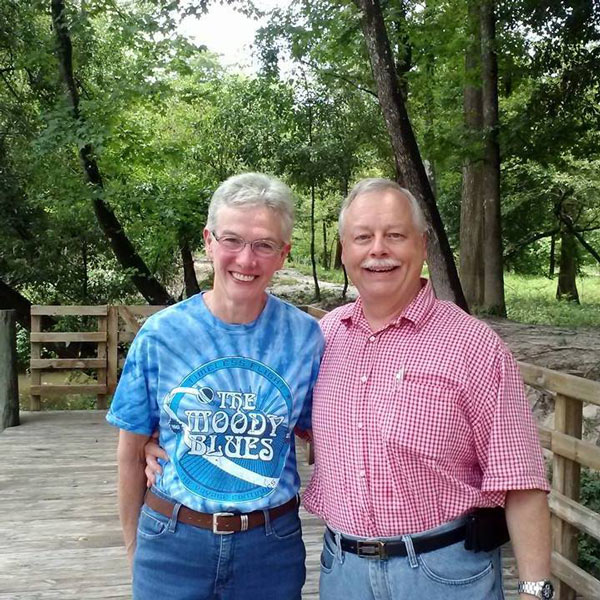 Q: What is your favorite part of your job?
Q: What is your favorite part of your job?
A: Piecing together the parts of a software process to make something that will make someone's job easier.
Q: What did you do before working for Keystone?
A: Worked for a programming staff supplement service. I worked at 2 customer sites over the 20+ years there.
Q: What are your hobbies outside of work?
A: Singing in a church choir, playing handbells.
Q: If you could go anywhere on vacation, where would you go?
A: Australia
Q: Do you have any pets? If so, what kind and what are their names?
A: We are currently without pets. We have had dogs, cats, guinea pigs, and a rabbit in the past.
